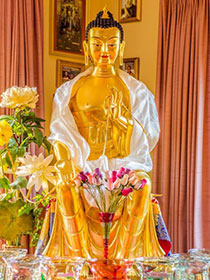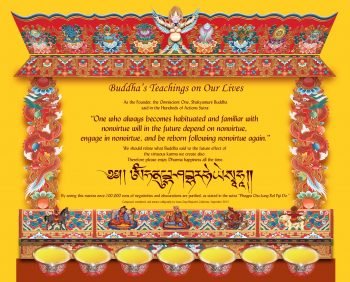- Home
- FPMT Homepage
Foundation for the Preservation of the Mahayana Tradition
The FPMT is an organization devoted to preserving and spreading Mahayana Buddhism worldwide by creating opportunities to listen, reflect, meditate, practice and actualize the unmistaken teachings of the Buddha and based on that experience spreading the Dharma to sentient beings. We provide integrated education through which people’s minds and hearts can be transformed into their highest potential for the benefit of others, inspired by an attitude of universal responsibility and service. We are committed to creating harmonious environments and helping all beings develop their full potential of infinite wisdom and compassion. Our organization is based on the Buddhist tradition of Lama Tsongkhapa of Tibet as taught to us by our founders Lama Thubten Yeshe and Lama Thubten Zopa Rinpoche.
- Willkommen
Die Stiftung zur Erhaltung der Mahayana Tradition (FPMT) ist eine Organisation, die sich weltweit für die Erhaltung und Verbreitung des Mahayana-Buddhismus einsetzt, indem sie Möglichkeiten schafft, den makellosen Lehren des Buddha zuzuhören, über sie zur reflektieren und zu meditieren und auf der Grundlage dieser Erfahrung das Dharma unter den Lebewesen zu verbreiten.
Wir bieten integrierte Schulungswege an, durch denen der Geist und das Herz der Menschen in ihr höchstes Potential verwandelt werden zum Wohl der anderen – inspiriert durch eine Haltung der universellen Verantwortung und dem Wunsch zu dienen. Wir haben uns verpflichtet, harmonische Umgebungen zu schaffen und allen Wesen zu helfen, ihr volles Potenzial unendlicher Weisheit und grenzenlosen Mitgefühls zu verwirklichen.
Unsere Organisation basiert auf der buddhistischen Tradition von Lama Tsongkhapa von Tibet, so wie sie uns von unseren Gründern Lama Thubten Yeshe und Lama Thubten Zopa Rinpoche gelehrt wird.
- Bienvenidos
La Fundación para la preservación de la tradición Mahayana (FPMT) es una organización que se dedica a preservar y difundir el budismo Mahayana en todo el mundo, creando oportunidades para escuchar, reflexionar, meditar, practicar y actualizar las enseñanzas inconfundibles de Buda y en base a esa experiencia difundir el Dharma a los seres.
Proporcionamos una educación integrada a través de la cual las mentes y los corazones de las personas se pueden transformar en su mayor potencial para el beneficio de los demás, inspirados por una actitud de responsabilidad y servicio universales. Estamos comprometidos a crear ambientes armoniosos y ayudar a todos los seres a desarrollar todo su potencial de infinita sabiduría y compasión.
Nuestra organización se basa en la tradición budista de Lama Tsongkhapa del Tíbet como nos lo enseñaron nuestros fundadores Lama Thubten Yeshe y Lama Zopa Rinpoche.
A continuación puede ver una lista de los centros y sus páginas web en su lengua preferida.
- Bienvenue
L’organisation de la FPMT a pour vocation la préservation et la diffusion du bouddhisme du mahayana dans le monde entier. Elle offre l’opportunité d’écouter, de réfléchir, de méditer, de pratiquer et de réaliser les enseignements excellents du Bouddha, pour ensuite transmettre le Dharma à tous les êtres. Nous proposons une formation intégrée grâce à laquelle le cœur et l’esprit de chacun peuvent accomplir leur potentiel le plus élevé pour le bien d’autrui, inspirés par le sens du service et une responsabilité universelle. Nous nous engageons à créer un environnement harmonieux et à aider tous les êtres à épanouir leur potentiel illimité de compassion et de sagesse. Notre organisation s’appuie sur la tradition guéloukpa de Lama Tsongkhapa du Tibet, telle qu’elle a été enseignée par nos fondateurs Lama Thoubtèn Yéshé et Lama Zopa Rinpoché.
Visitez le site de notre Editions Mahayana pour les traductions, conseils et nouvelles du Bureau international en français.
Voici une liste de centres et de leurs sites dans votre langue préférée
- Benvenuto
L’FPMT è un organizzazione il cui scopo è preservare e diffondere il Buddhismo Mahayana nel mondo, creando occasioni di ascolto, riflessione, meditazione e pratica dei perfetti insegnamenti del Buddha, al fine di attualizzare e diffondere il Dharma fra tutti gli esseri senzienti.
Offriamo un’educazione integrata, che può trasformare la mente e i cuori delle persone nel loro massimo potenziale, per il beneficio di tutti gli esseri, ispirati da un’attitudine di responsabilità universale e di servizio.
Il nostro obiettivo è quello di creare contesti armoniosi e aiutare tutti gli esseri a sviluppare in modo completo le proprie potenzialità di infinita saggezza e compassione.
La nostra organizzazione si basa sulla tradizione buddhista di Lama Tsongkhapa del Tibet, così come ci è stata insegnata dai nostri fondatori Lama Thubten Yeshe e Lama Zopa Rinpoche.
Di seguito potete trovare un elenco dei centri e dei loro siti nella lingua da voi prescelta.
- 欢迎 / 歡迎
简体中文
“护持大乘法脉基金会”( 英文简称:FPMT。全名:Foundation for the Preservation of the Mahayana Tradition) 是一个致力于护持和弘扬大乘佛法的国际佛教组织。我们提供听闻,思维,禅修,修行和实证佛陀无误教法的机会,以便让一切众生都能够享受佛法的指引和滋润。
我们全力创造和谐融洽的环境, 为人们提供解行并重的完整佛法教育,以便启发内在的环宇悲心及责任心,并开发内心所蕴藏的巨大潜能 — 无限的智慧与悲心 — 以便利益和服务一切有情。
FPMT的创办人是图腾耶喜喇嘛和喇嘛梭巴仁波切。我们所修习的是由两位上师所教导的,西藏喀巴大师的佛法传承。
繁體中文
護持大乘法脈基金會”( 英文簡稱:FPMT。全名:Found
ation for the Preservation of the Mahayana Tradition ) 是一個致力於護持和弘揚大乘佛法的國際佛教組織。我們提供聽聞, 思維,禪修,修行和實證佛陀無誤教法的機會,以便讓一切眾生都能 夠享受佛法的指引和滋潤。 我們全力創造和諧融洽的環境,
為人們提供解行並重的完整佛法教育,以便啟發內在的環宇悲心及責 任心,並開發內心所蘊藏的巨大潛能 — 無限的智慧與悲心 – – 以便利益和服務一切有情。 FPMT的創辦人是圖騰耶喜喇嘛和喇嘛梭巴仁波切。
我們所修習的是由兩位上師所教導的,西藏喀巴大師的佛法傳承。 察看道场信息:
- FPMT Homepage
- News/Media
-
- Study & Practice
-
-
- About FPMT Education Services
- Latest News
- Programs
- New to Buddhism?
- Buddhist Mind Science: Activating Your Potential
- Heart Advice for Death and Dying
- Discovering Buddhism
- Living in the Path
- Exploring Buddhism
- FPMT Basic Program
- FPMT Masters Program
- FPMT In-Depth Meditation Training
- Maitripa College
- Lotsawa Rinchen Zangpo Translator Program
- Universal Education for Compassion & Wisdom
- Online Learning Center
-
- Prayers & Practice Materials
- Overview of Prayers & Practices
- Full Catalogue of Prayers & Practice Materials
- Explore Popular Topics
- Benefiting Animals
- Chenrezig Resources
- Death & Dying Resources
- Lama Chopa (Guru Puja)
- Lama Zopa Rinpoche: Compendium of Precious Instructions
- Lama Zopa Rinpoche: Life Practice Advice
- Lama Zopa Rinpoche Practice Series
- Lamrim Resources
- Mantras
- Prayer Book Updates
- Purification Practices
- Sutras
- Thought Transformation (Lojong)
- Audio Materials
- Dharma Dates - Tibetan Calendar
- Translation Services
- Publishing Services
- Ways to Offer Support
- Prayers & Practice Materials
-
- Teachings and Advice
- Find Teachings and Advice
- Lama Zopa Rinpoche Advice Page
- Lama Zopa Rinpoche: Compendium of Precious Instructions
- Lama Zopa Rinpoche Video Teachings
- ༧སྐྱབས་རྗེ་བཟོད་པ་རིན་པོ་ཆེ་མཆོག་ནས་སྩལ་བའི་བཀའ་སློབ་བརྙན་འཕྲིན།
- Podcasts
- Lama Yeshe Wisdom Archive
- Buddhism FAQ
- Dharma for Young People
- Resources on Holy Objects
- Teachings and Advice
-
-
*If a menu item has a submenu clicking once will expand the menu clicking twice will open the page.
-
-
- Centers
-
- Teachers
-
- Projects
-
-
-
-
*If a menu item has a submenu clicking once will expand the menu clicking twice will open the page.
-
-
- FPMT
-
-
-
-
-
Actions that give harm to other sentient beings aren’t those of a bodhisattva. In Buddhism, there’s no such thing as a holy war. You have to understand this. It’s impossible to equalize everybody on earth through force.
Lama Thubten Yeshe
-
-
-
- Shop
-
-
-
The Foundation Store is FPMT’s online shop and features a vast selection of Buddhist study and practice materials written or recommended by our lineage gurus. These items include homestudy programs, prayers and practices in PDF or eBook format, materials for children, and other resources to support practitioners.
Items displayed in the shop are made available for Dharma practice and educational purposes, and never for the purpose of profiting from their sale. Please read FPMT Foundation Store Policy Regarding Dharma Items for more information.
-
-
Lama Zopa Rinpoche News and Advice
7
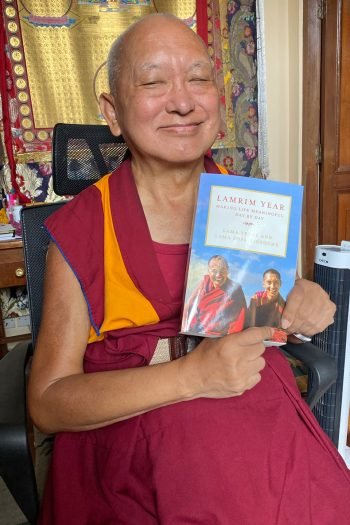
Lama Zopa Rinpoche holding the book Lamrim Year, Kopan Monastery, Nepal, July 2021. Photo by Ven. Roger Kunsang.
Lamrim Year: Making Life Meaningful Day By Day is an essential guide for students at any level of Buddhist study who want to develop their mind in the graduated path to enlightenment (lamrim).
The book was inspired by Lama Zopa Rinpoche’s 2013 advise to students on how they could study the entire lamrim over the course of a year:
“My suggestion would be to divide the twelve months of the year into lamrim meditations and then meditate on each subject for one month or two weeks to finish the whole lamrim in one year. . . . To meditate like this each year, wow, wow, wow! That would be great. Your life would be so rich and you would be getting closer to realization and closer to enlightenment. At the time of death you can be happy and satisfied that you spent enough of your life practicing Dharma.”
Taking Rinpoche’s advice to heart, Alison Murdoch, who compiled and edited Lamrim Year, set out to work her way through the indispensable lamrim text Liberation in the Palm of Your Hand, by the great Buddhist master Pabongka Rinpoche. Finding it hard to maintain daily momentum, she writes in the book’s Editor’s Preface that she had the idea to create “a 365-page daily route map through the lamrim that would consist entirely of extracts from the teachings of Lama Yeshe and Lama Zopa Rinpoche, and provide the best possible chance of fulfilling Rinpoche’s advice in the rough and tumble of modern life.”
Lamrim Year provides a 365-day outline of the graduated path in a clear, practical format that is suitable for both individual and group practice. Each day has a page with a quote and text selected from four decades of teachings by Lama Yeshe and Lama Zopa Rinpoche. The page concludes with a recap summarizing the main points for reflection and a reference to the lamrim topics covered, which closely follows the outline in Liberation in the Palm of Your Hand.
Here’s an excerpt from Lamrim Year: Making Life Meaningful Day By Day, published by Lama Yeshe Wisdom Archive:
Day 64: The Perfect Human Rebirth (Lama Zopa Rinpoche)
“An appreciation of the perfect human rebirth is fundamental to our Dharma journey”
—Lama Zopa Rinpoche
The great meditator, Lama Tsongkhapa, who formalized the whole lamrim structure, broke the lamrim up into two: appreciation of this life of freedom and richness—the perfect human rebirth—and how to make use of this precious opportunity—the rest of the lamrim topics from impermanence and death, refuge and karma up to the point where we attain full enlightenment.
The lamrim is not like a buffet, where we can pick and choose whatever we fancy. We have to eat the whole feast, otherwise we won’t get what we want, liberation or enlightenment. When we explore the lamrim we will see how each topic leads to the next and how each is therefore indispensable. The meditations on the perfect human rebirth come right at the beginning of the path, just after relying on a spiritual teacher. We need to understand karma and we need to have refuge, and to deepen our commitment we need to understand impermanence and death. But none of that will happen if we squander this precious and unique opportunity that we now have, this one time only.
Only those of us with this perfect human rebirth can become inner scientists and discover the true cause of happiness. We’re unbelievably fortunate. We have the opportunity to study, meditate, and understand everything that the Buddha taught, from the simplest lamrim topic to the most advanced. We have the opportunity to develop the altruistic heart, the attitude that wishes to be fully awakened to benefit others, and to understand the reality of things and events—emptiness. There is nothing we cannot understand with this perfect human rebirth.
- The first section of the lamrim focuses on the perfect human rebirth
- Each lamrim topic is an essential step on the journey to enlightenment
- Only a perfect human rebirth gives us the opportunity to discover true happiness
You can find links to more excerpts from Lamrim Year: Making Life Meaningful Day By Day at the Lama Yeshe Wisdom Archive website.
For a printed copy of Lamrim Year: Making Life Meaningful Day By Day and links to more excerpts, visit the Lama Yeshe Wisdom Archive website:
https://lamayeshe.com/shop/lamrim-year-book
You can find the ebook version of Lamrim Year: Making Life Meaningful Day By Day on the FPMT Foundation Store:
https://shop.fpmt.org/Lamrim-Year-Making-Life-Meaningful-Day-By-Day-eBook-_p_3438.html
For more resources on lamrim study, see the FPMT Education Services “Lamrim” page:
https://fpmt.org/education/prayers-and-practice-materials/lam-rim/
Lama Zopa Rinpoche is the spiritual director of the Foundation for the Preservation of Mahayana Tradition (FPMT), a Tibetan Buddhist organization dedicated to the transmission of the Mahayana Buddhist tradition and values worldwide through teaching, meditation and community service.
2
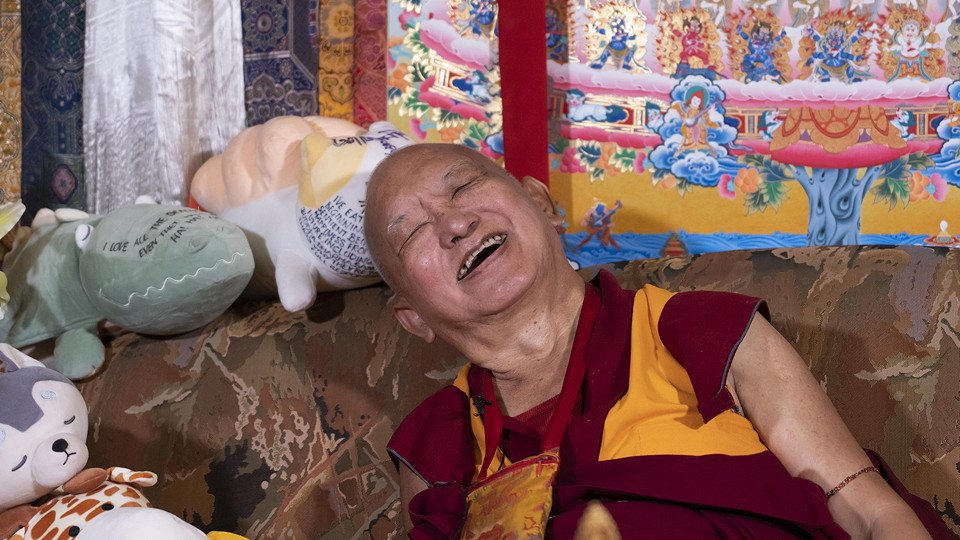
Rinpoche laughing during a video teaching, Kopan Monastery, Nepal, August 2021. Photo by Ven. Lobsang Sherab.
Lama Zopa Rinpoche continues his video teachings on thought transformation from Kopan Monastery in Nepal. Here is a summary of the most recent teaching:
Rinpoche continues offering teachings specifically intended for ordained Sangha, but everyone is welcome to benefit from Rinpoche’s advice. He begins this video teaching by reminding us that we have received this perfect human rebirth with the freedom to practice Dharma qualified by the eight freedoms and ten richnesses. This rebirth is extremely rare and precious. Even having the first freedom of not being born in hell is most precious.
It is important to understand your own samsaric suffering. If you don’t, you can’t generate compassion for all sentient beings. You must view being in samsara as being in the center of a fire. You have to feel all of your suffering as unbearable, not as pleasure. From that, great compassion for every sentient being comes. From that, bodhichitta arises—the thought to free all beings from oceans of samsaric suffering and bring them to enlightenment. For that, we need omniscience and enlightenment for ourselves. No one achieves enlightenment without saying goodbye to samsara.
This life is amazing, but it can stop at any time. Right now there are numberless beings dying in the mother’s womb, as babies, as children, in middle age, in old age; one’s breathing can stop at any time. It is like a bubble in water or lightning in the sky.
Rinpoche then discusses the power of holy objects and the benefits of building statues, stupas, and temples. Often building statues and temples doesn’t make sense to Westerners. They think it is too expensive and a waste of money, Rinpoche explains, because they don’t understand the benefits.
Rinpoche quotes from and gives commentary on Sutra Requested by King Prasenajit:
According to however many subtle atoms
Stupas or statues of the Bhagavan have,
For that many lifetimes the human beings who construct them
Will definitely attain wheel-turning king in the deva realm above ground.
They will experience all the supreme grounds
Of perfect concentration of the form and formless realms
And, at the end, they will attain the state of a buddha,
Which is free from the sufferings of birth, aging, and so forth.
Even the creatures killed under the feet of people building a temple will not fall into the lower realms. The teachings of Pandita Nagkyi Rinchen say:
The sentient beings touched by the smoke from preparing food and drink for those making
a place for the Three Rare Sublime Ones to abide and also the creatures killed under the
feet of the workers will not fall into the abodes of the three lower realms.
Even looking at a drawing of a buddha when you are angry causes you to gradually see ten million buddhas. From White Lotus Sutra:
Even if with an angry mind you look
At a drawing of a buddha’s body on a stone wall,
Gradually you will see ten million buddhas.
His Holiness the Dalai Lama said that the real stupa is the realizations of the path to enlightenment within you. You need to dedicate yourself to actualizing the lamrim. No matter how much practice, prostrations, and mantras you do, the main path is listening, reflecting, and meditating on the lamrim.
You cannot receive the blessings of the buddhas without a guru. From Dütsii Nyingpo, Essential Nectar:
Even if the beams of the sun are so hot,
Without a magnifying glass they cannot produce fire.
Like that, also the Buddha’s blessings
Cannot be received without a guru.
Like that, by pleasing the guru,
You please all the buddhas.
The guru is the channel through which the ten-direction buddhas guide you and speak to you. You should serve the guru with the mindfulness that the guru is the channel for all the buddhas. The guru is not just someone who gives you a Dharma education. That is a very ordinary view. Without strong guru devotion, heresy and anger arise in relation to the guru, and you create the heaviest negative karma among the negative karmas. Because the essence is pleasing the guru, you need to concentrate on that in everyday life. By pleasing the guru, negative karmas get burned in one second!
Some people spend their whole lives meditating without an object because they don’t have a correct guru. After some time, your mind becomes dull. In this world it is very difficult to meet a perfect guru. For those that do not have the merit to meet a perfect guru and receive perfect teachings, and who have so much suffering and are going on the wrong path, you can develop compassion for them.
You also cannot achieve enlightenment without bodhichitta. As much as possible, do everything with bodhichitta. Even if you don’t have a realization of bodhichitta, but have a bodhichitta motivation, everything you do becomes a cause for enlightenment. By making requests to your guru with firm devotion, you develop realizations.
In order to achieve enlightenment in a brief lifetime, you need to practice highest yoga tantra because otherwise you lose the opportunity. Then, to be able to develop compassion, to be able to develop the graduated path to enlightenment, you need to purify the obstacles, obscurations, and negative karma, and collect the necessary conditions and merit.
The essence of the practice is persevering in the higher training of morality. You should take the individual liberation vow as your heart practice. Morality is the heart practice. You cannot practice Dharma separately from keeping your promised morality. You should keep the three vows that you have taken: the individual liberation vow, the bodhisattva vows, and the tantric vows.
Where you go in your future life depends on your present actions. You can tell what types of actions you did in the past by looking at your current life, and where you will go next life depends on today.
We invite you to go deeper into the topics presented here, plus many others, by watching Rinpoche’s video and reading the full transcript of Rinpoche’s teaching.
Watch Lama Zopa Rinpoche’s teaching “There Is Nothing More Sublime Than Practicing the Higher Training of Morality”:
- Read the transcript of Rinpoche’s teaching
- Prayer for the Flourishing of Je Tsongkhapa’s Teachings PDF
- Find resources to support your study of lamrim
- Learn more about FPMT’s Holy Objects Fund
- Find Rinpoche’s Teachings on Thought Transformation translated into Spanish, Italian, French, Chinese, and Russian
- Dedication verses
Watch more from the video series Lama Zopa Rinpoche’s Teachings on Thought Transformation and find links to videos in transcripts, MP3s, additional practice advice, and more:
https://fpmt.org/fpmt/announcements/resources-for-coronavirus-pandemic/advice-from-lama-zopa-rinpoche-for-coronavirus/
Practice advice from our teachers, Dharma study-from-home opportunities, and more can be found on the page “Resources for the Coronavirus Pandemic.”
Lama Zopa Rinpoche is the spiritual director of the Foundation for the Preservation of Mahayana Tradition (FPMT), a Tibetan Buddhist organization dedicated to the transmission of the Mahayana Buddhist tradition and values worldwide through teaching, meditation and community service.
- Tagged: advice from lama zopa rinpoche, coronavirus, lama zopa rinpoche advice for sangha, lama zopa rinpoche thought transformation video teaching, lamrim, perfect human rebirth, three higher trainings, video
1
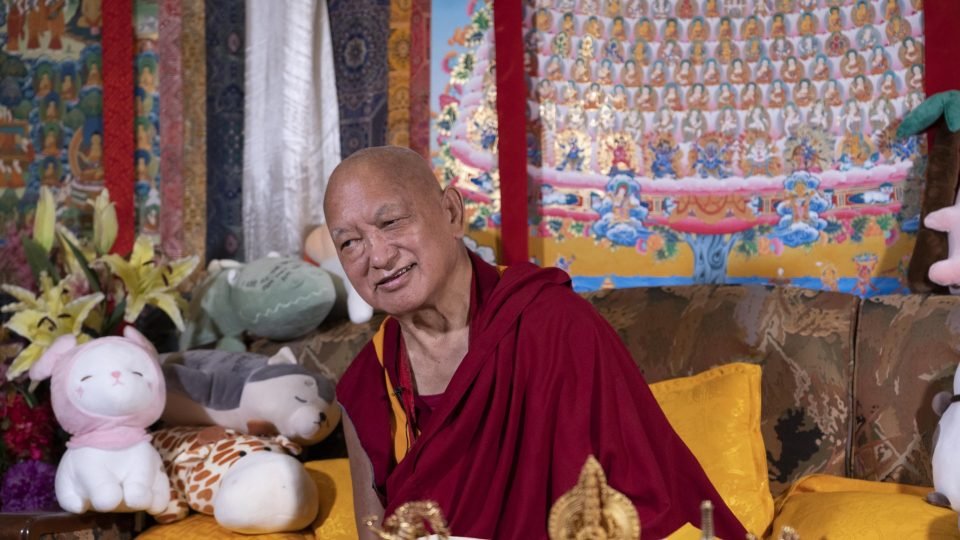
Lama Zopa Rinpoche during his thought transformation teachings, Kopan Monastery, Nepal, August 2021. Photo by Ven. Lobsang Sherab.
Since our last update, Lama Zopa Rinpoche has remained in Nepal, engaging in a variety of beneficial activities for others. We invite you to rejoice in Rinpoche’s constant compassionate service to others!
Lama Zopa Rinpoche has been continuing his thought transformation teaching series with specific teachings for ordained Sangha. Rinpoche emphasized that while these teachings were given for Sangha, everyone is encouraged to listen and benefit from the advice. Rinpoche also has continued teaching in Tibetan for Kopan monks and nuns—and for anyone else who speaks Tibetan. Additionally, Rinpoche put together some essential practices in Tibetan, which are freely available. Recent additions are Motivation for Tibetan Elders as well as Sur practice.
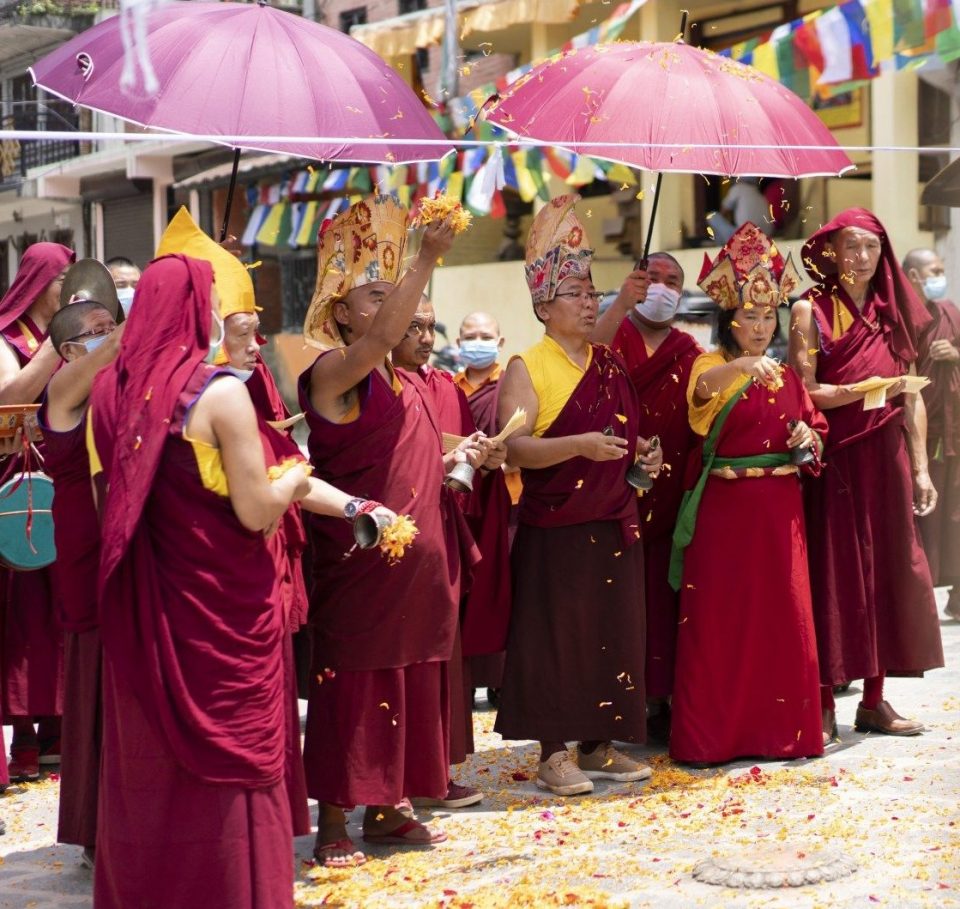
Lama Zopa Rinpoche, Khadro-la, Mingyur Rinpoche, and Tsoknyi Rinpoche during puja at Namo Buddha, Nepal, July 6, 2021. Photo by Ven. Lobsang Sherab.
In June and July Lama Zopa Rinpoche and other lamas offered several powerful pujas in holy places around Kathmandu and nearby. These pujas were done to benefit all those affected by the pandemic in all ways, and to mitigate the continued spread of the virus. Additionally in August, Rinpoche and the Kopan monks offered Most Secret Hayagriva Elaborate Tsog Puja to benefit the entire FPMT organization and to remove obstacles related to the pandemic. Prayers to Hayagriva are especially beneficial in these degenerate times when sufferings and illnesses are uncontrolled. As a manifestation of Chenrezig, Hayagriva practice also helps develop compassion and is very powerful for generating merit as well.
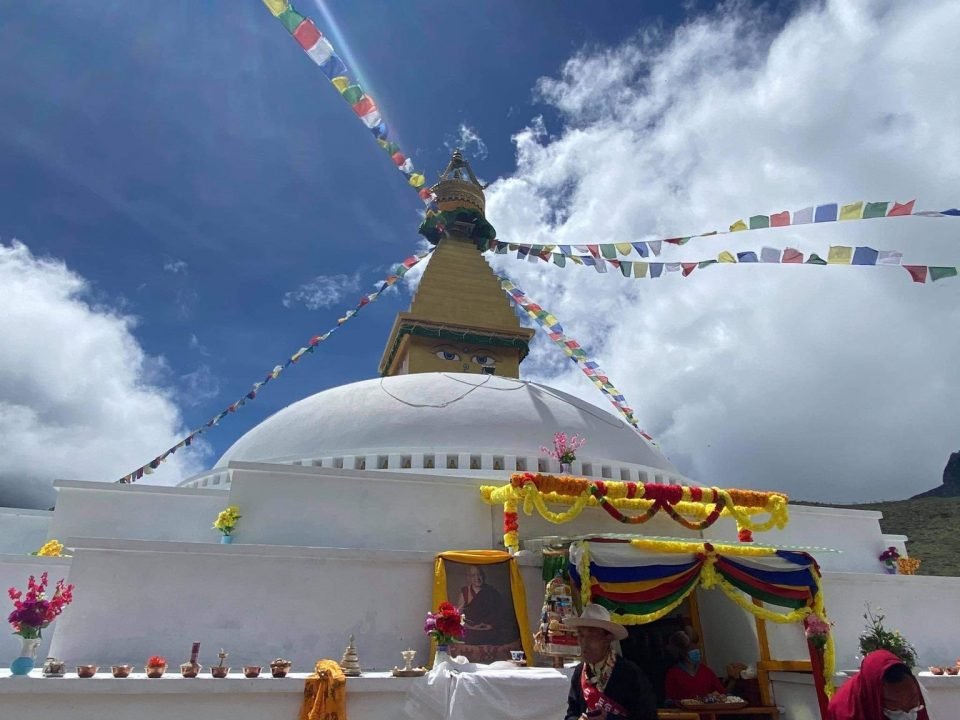
The consecration of the new stupa in Thame happening at the same time as Rinpoche’s consecration of it from Kopan Monastery, Thame, Solu Khumbu, Nepal, June 2021
On June 21, Rinpoche consecrated a stupa that the Holy Objects Fund is sponsoring in Thame, Nepal. The new stupa stands nearly 46 feet (14 meters) tall with a base measuring 54 feet (16.5 meters) across. It took two years to complete and is larger than the previous stupa, which was destroyed as a result of the 2015 earthquake. Due to travel restrictions, Rinpoche wasn’t able to attend the consecration so he offered the consecration remotely from Kopan Monastery.
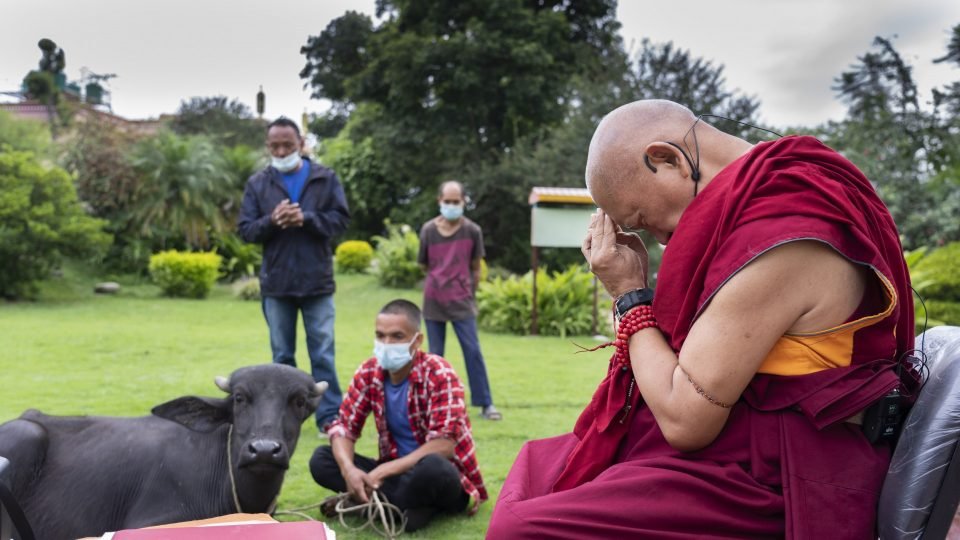
Lama Zopa Rinpoche offering prayers to a rescued water buffalo Rinpoche named Bodhichitta, August 2021. Photo by Ven. Lobsang Sherab.
Demonstrating, yet again, his compassionate service to all beings, Rinpoche recently liberated and blessed a water buffalo, which are often butchered for meat in Nepal. The buffalo appeared to have a strong connection to Rinpoche and shed tears while Rinpoche was reciting various mantras and Three Principal Aspects of the Path. You can read more about this heart-warming story.
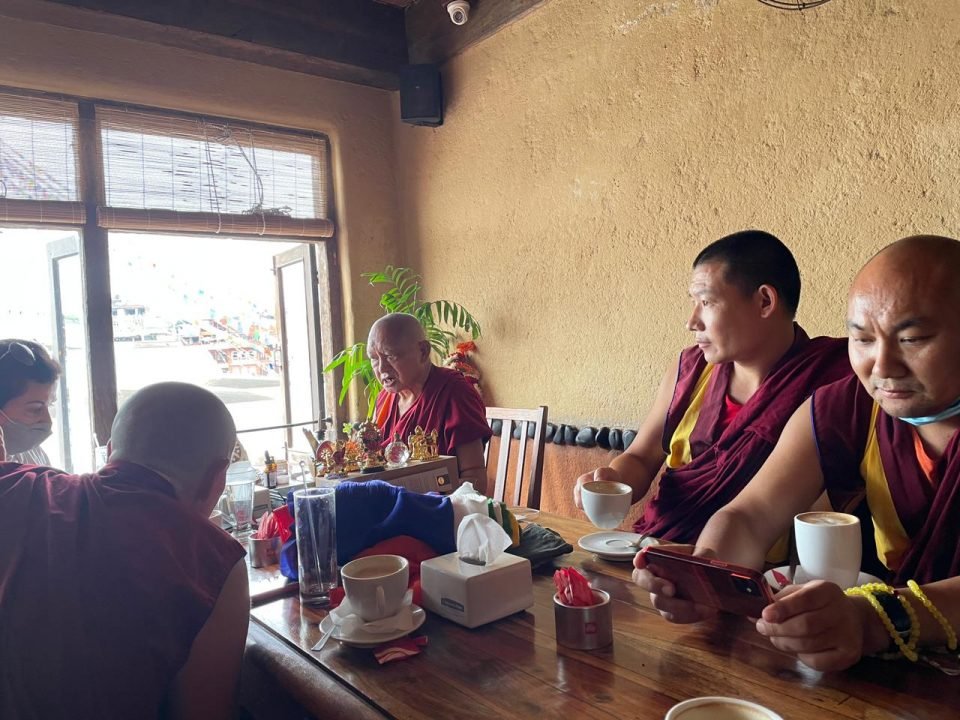
Lama Zopa Rinpoche offering puja from a restaurant overlooking Boudhanath Stupa, July 2021. Photo by Ven. Lobsang Sherab.
Rinpoche regularly circumambulates Boudhanath Stupa, often late at night, reciting the multiplying mantra while making extensive visualized offerings. On one of these occasions of visiting the stupa to offer prayers, Rinpoche stopped at a restaurant and offered an elaborate tsog puja with auspicious objects to the stupa. Rinpoche also visits Swayambhunath and stops in front of places where the bodies of those who have died are being cremated, spending a long time making prayers and reciting the requesting prayer to Chenrezig.
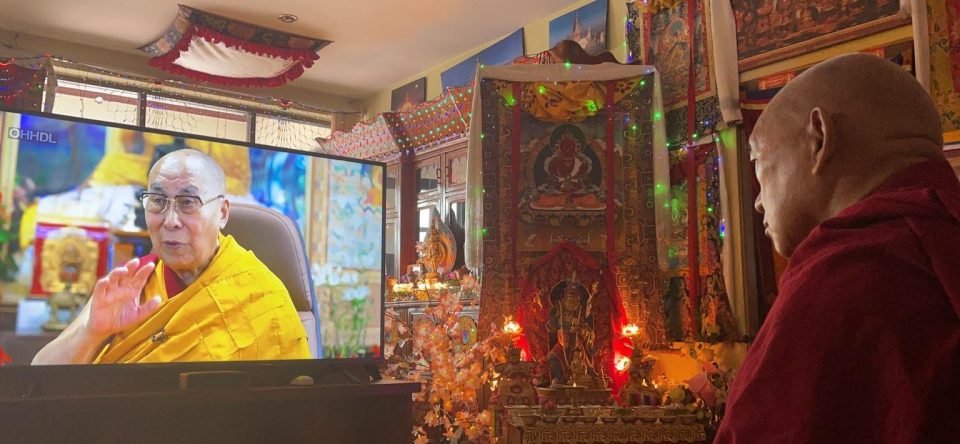
Lama Zopa Rinpoche watching His Holiness the Dalai Lama’s teachings online from Kopan Monastery. Photo by Ven. Lobsang Sherab.
Rinpoche has watched His Holiness the Dalai Lama’s recent teachings from Kopan Monastery via livestream from www.dalailama.com/live.
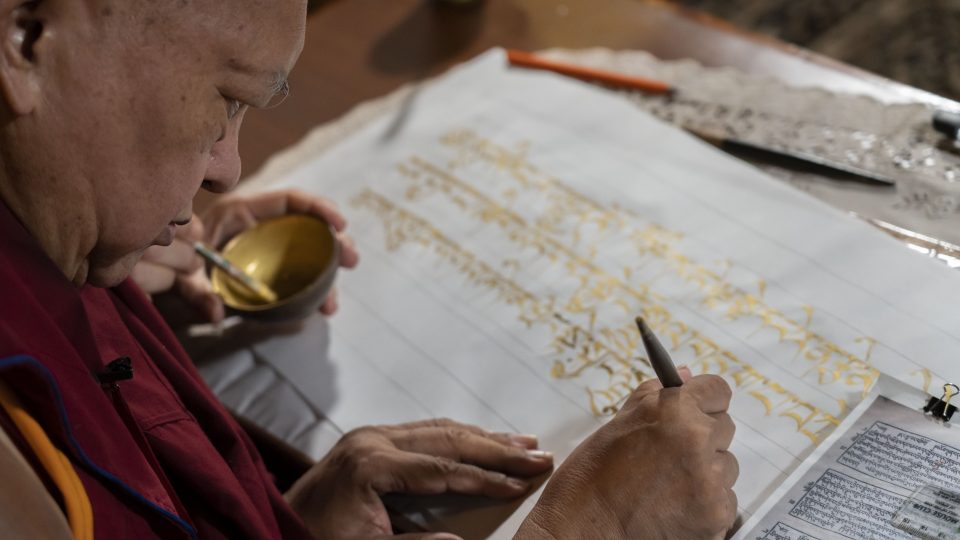
Lama Zopa Rinpoche writing out the Prajnaparamita in pure gold. Photo by Ven. Lobsang Sherab.
In two recent video teachings Rinpoche talks about the history of the project to write out the Prajnaparamita in gold, which Rinpoche and a few others have been working on for the past sixteen years. Rinpoche discusses the benefits of writing out this precious sutra, giving extensive commentary on the sutra’s incredible benefits. He also talks about the process for writing it out, including the need for precise calligraphy and high quality supplies.
These are just a few of the many auspicious activities Lama Zopa Rinpoche has been engaged in over the past two months in Nepal. We invite you to enjoy the new online gallery of photos, which show even more of Rinpoche’s recent activities, in which we can all rejoice:
Visit the July and August 2021 photo album:
https://fpmt.org/teachers/zopa/gallery/nepal-july-august-2021/
Lama Zopa Rinpoche is the spiritual director of the Foundation for the Preservation of Mahayana Tradition (FPMT), a Tibetan Buddhist organization dedicated to the transmission of the Mahayana Buddhist tradition and values worldwide through teaching, meditation and community service.
Watch the video series Lama Zopa Rinpoche’s Teachings on Thought Transformation during the Time of COVID-19 and find links to videos in transcripts, MP3s, additional practice advice, and more:
https://fpmt.org/fpmt/announcements/resources-for-coronavirus-pandemic/advice-from-lama-zopa-rinpoche-for-coronavirus/
- Tagged: animal liberation, boudhanath stupa, hayagriva puja, lama zopa rinpoche, lama zopa rinpoche activities, lama zopa rinpoche thought transformation video teaching, pujas, thame
25
Being Sangha Is Not a Trip
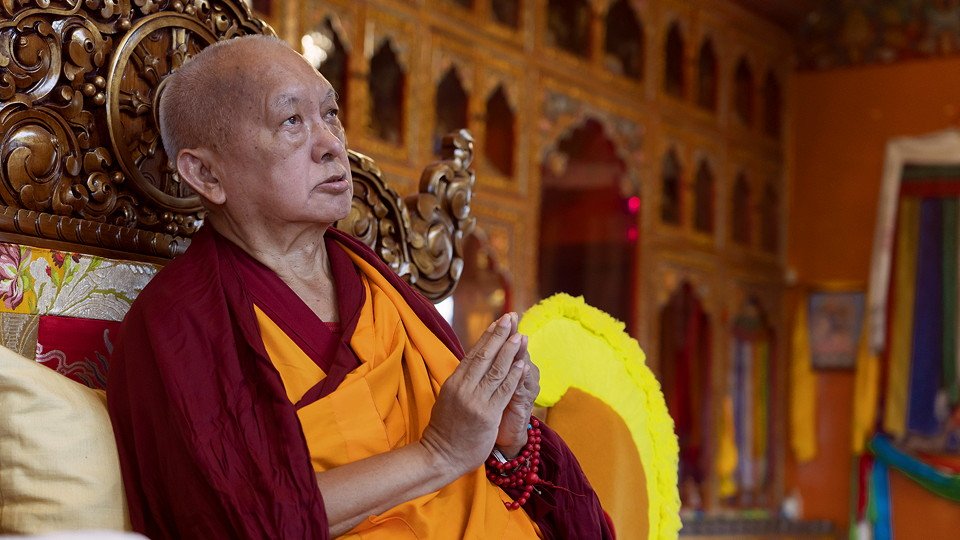
Lama Zopa Rinpoche during Lama Chopa puja, Kopan Monastery, Nepal, August 2021. Photo by Ven. Lobsang Sherab.
Lama Zopa Rinpoche continues his video teachings on thought transformation from Kopan Monastery in Nepal. Here is a summary of the most recent teaching:
Rinpoche begins this teaching by reminding us that while we are so fortunate to have received this rare and perfect human rebirth, which is qualified by the eight freedoms and ten richnesses, death can happen at any time, even before this teaching ends.
Therefore, the real purpose of life is not just to achieve liberation from samsara for ourselves alone, but to never harm and only benefit all sentient beings by freeing them from the oceans of samsara, the total cessation of the gross and subtle obscurations and the completion of realizations. That means every single one, including every ant and fly, and even those you can’t see with your eyes. As a human, this should be the purpose of life. This should be our attitude all day and night, even if we are enjoying ourselves in a five-star hotel, even if we are in the process of dying—we can enjoy for sentient beings, we can die for sentient beings! To bring every sentient being to enlightenment by oneself alone is the purpose of life, therefore we must achieve a state of omniscience as quickly as possible. Therefore, I’m going to listen to the teachings.
Rinpoche shares that the current incarnation of Domo Geshe Rinpoche is going to be an incredible benefit to the world by helping the teachings spread and last a long time. Rinpoche currently offers help for this young lamas’ yearly expenses.
Rinpoche also shared some stories of Sera Je Khen Rinpoche Lobsang Delek’s life in the Buxa Duar, the camp in India where refugee Tibetan monks lived in the 1960s.
Rinpoche reminds us that these teachings are specifically for the ordained Sangha, to remind them that it is most important to live a life in ordination and that this is not just some hippie trip. However, anyone is welcome to listen and benefit from this advice.
Rinpoche then discusses sections from Garland of Jewel Light by Geshe Tsewang Samdrub. He begins by offering commentary on the four doors for receiving downfalls from breaking vows:
1. A lack of conscientiousness.
2. A lack of respect.
3. Not knowing the vows.
4. Having many delusions.
His Holiness the Dalai Lama has emphasized the need to live an ethical life, to be a good human being, Rinpoche says. To do this, you need discipline to practice patience, tolerance, compassion, loving-kindness, and forgiveness for those who harm you, and to immediately apologize when you harm others.
Rinpoche explains the four ways to prevent downfalls, citing Garland of Jewel Light:
1. Continuously possessing conscientiousness.
2. Having great respect for the vows of morality.
3. Knowing the vows.
4. Striving in the remedy to the delusions.
When you do these, the doors to making mistakes and downfalls are closed.
Rinpoche then goes over the benefits of protecting morality, again from Garland of Jewel Light:
1. All your collections of goodness will increase and develop.
2. You will be praised by the buddhas.
3. You will be praised by the devas.
4. You will be praised by your friends.
5. You will be worthy of being praised by even yourself.
6. You will be worthy of being naturally praised.
7. Your reputation will cover all the directions.
8. You will listen to the holy Dharma.
9. You will not forget the holy Dharma you listened to.
10. Your realizations of the paths and bhumis will increase.
11. When you die you will be happy and you will go to a happy transmigration.
12. Day and night you will be happy.
13. You will be protected by the devas.
14. You will be happy in front of holy beings.
15. You won’t be able to be harmed by human beings and non-human beings.
16. You will receive whatever enjoyments you need without effort.
17. Whatever prayers you do will succeed.
The results of living in pure vows are very powerful. “You become Dzambhala!” Rinpoche says. “When other people make offerings to you and respect you, they collect much merits. And then, if you pray for them, your prayers are so powerful that there is success for them. Like that, your pujas and your prayers are very powerful.”
We invite you to go deeper into the topics presented here, plus many others, by watching Rinpoche’s video and reading the full transcript of Rinpoche’s teaching.
Watch Lama Zopa Rinpoche’s teaching “Being Sangha Is Not a Trip”:
https://youtu.be/LgmNLjvt564
- Read the transcript of Rinpoche’s teaching
- Find Rinpoche’s Teachings on Thought Transformation translated into Spanish, Italian, French, Chinese, and Russian
- Dedication verses for COVID-19 Crisis Teachings
Watch more from the video series Lama Zopa Rinpoche’s Teachings on Thought Transformation during the Time of COVID-19 and find links to videos in transcripts, MP3s, additional practice advice, and more:
https://fpmt.org/fpmt/announcements/resources-for-coronavirus-pandemic/advice-from-lama-zopa-rinpoche-for-coronavirus/
Practice advice from our teachers, Dharma study-from-home opportunities, and more can be found on the page “Resources for the Coronavirus Pandemic.”
Lama Zopa Rinpoche is the spiritual director of the Foundation for the Preservation of Mahayana Tradition (FPMT), a Tibetan Buddhist organization dedicated to the transmission of the Mahayana Buddhist tradition and values worldwide through teaching, meditation and community service.
- Tagged: advice from lama zopa rinpoche, coronavirus, domo geshe rinpoche, garland of jewel light, lama zopa rinpoche advice for sangha, lama zopa rinpoche thought transformation video teaching, video
24
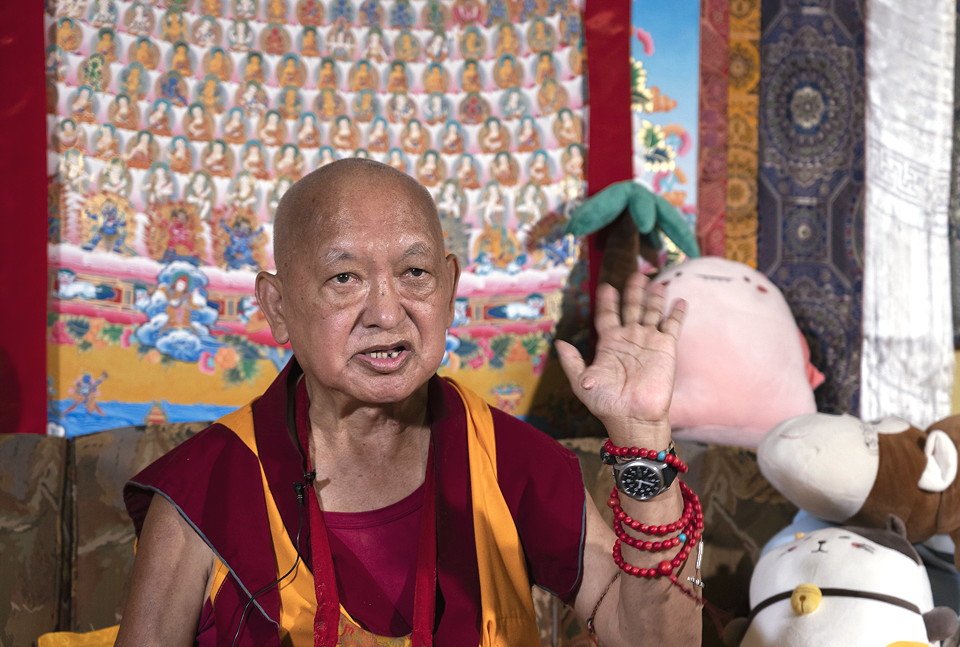
Lama Zopa Rinpoche during a video teaching on thought transformation, Kopan Monastery, Nepal, August 2021. Photo by Ven. Lobsang Sherab.
Lama Zopa Rinpoche continues his video teachings on thought transformation from Kopan Monastery in Nepal. Here is a summary of the most recent teaching:
Rinpoche begins this teaching by reminding us of how fortunate we are to wake up in the morning with a perfect human rebirth that is qualified by the eight freedoms and ten richnesses. The life we have is like a candle flame in the wind or a bubble in the water, and can be stopped at any time by death. Rinpoche references verse 55 from Nagarjuna’s Letter to a Friend:
Since there are many harms to life, it is more impermanent
Than even a water bubble that can be popped by the wind.
Therefore, how wonderful it is to have the freedom
To be able to wake up from sleep, breathing in and out.
Last night many people went to bed, thinking they had another day to live, but their body became a corpse instead. However, you were able to wake up. Every day you are able to wake up is a real birthday. If you can recognize impermanence and death, it is like skies of happiness! You didn’t die! You aren’t in hell! You weren’t reborn as a hungry ghost or an animal! You can still use your perfect human rebirth to collect merit and purify negative karma. Even reciting OM MANI PADME HUM without a bodhichitta motivation, you collect more merits than drops of water in the ocean, more than blades of grass growing on the hills.
When your breathing stops it will be difficult for your mind to be happy. A verse from Gungthang Tenpai Dronme’s Verses of Advice for Meditating on Impermanence says:
While you are still breathing,
If you don’t accomplish stable happiness,
When your breathing in and out stops,
It will be difficult for your mind to be happy.
Rinpoche then reminds us of the motivation for listening to these teachings. At this time, while we are still breathing, it is not enough to achieve liberation from samsara for oneself. That alone would be a meaningful life, but it is not sufficient. The main purpose of life is to benefit sentient beings, not harming a single one, and more than that to free them from oceans of samsaric suffering and bring them to enlightenment by oneself alone. To do that, we must achieve full enlightenment. Therefore, with a motivation to accomplish this, we listen to the teachings.
Rinpoche offers advice to the gelongs about what brings happiness according to several verses of the Sutra of Individual Liberation (from sojong). You can hear Rinpoche discuss these verses and his commentary on each starting at 11:50 in the video.
Without morality, Rinpoche stresses, we cannot accomplish our own work, let alone successfully work for others. “Therefore,” as noted in the Thirty-Seven Practices of a Bodhisattva by Thogme Sangpo (verse 26cd), “to protect morality without wishing for samsara is a practice of a bodhisattva.”
For a bodhisattva, those who offer harm are like a precious treasure (Thirty-Seven Practices of a Bodhisattva, verse 27ab):
For the bodhisattvas who desire the enjoyment of virtue,
All harm-givers are like a precious treasure.
Therefore, cherish evil beings like a precious treasure, as advised in Eight Verses for Training the Mind by Langri Tangpa:
When I see sentient beings of evil nature
Who engage in negative karma and have much suffering,
Since they are difficult to find I will cherish them,
Like finding a precious treasure.
Rinpoche stresses that it is important to understand what this means. People who create harm for others create so much negative karma and have so much suffering. When you see that it is like you have found a precious treasure, a diamond, gold, a sapphire, a wish-granting jewel in the garbage. They are so precious and rare that you must cherish them, like how some cherish money so much! Why? Because by cherishing them you generate strong renunciation of your own samsara and sooo much compassion for them. From that, you generate strong bodhichitta, and from that, quick enlightenment. And with that you can liberate the numberless sentient beings from oceans of samsaric suffering. A jewel or money doesn’t do that, but this type of person can! So cherish them.
Another verse Rinpoche emphasizes in this teaching and suggests we write down in our prayer books is verse 28 from Thirty-Seven Practices of a Bodhisattva:
Since even the hearer-listeners and solitary realizers, who achieve only the works for self,
Are seen to make effort, like putting out a fire on the head,
It is a practice of a bodhisattva to make effort to receive all qualities
For the sake of all transmigratory beings.
Even when you seek liberation for just yourself, when delusion arises, you put effort into getting rid of the delusion, like putting out a spark of fire on your head. But when you do it to liberate every single hell being, hungry ghost, animal, and human being, you do it so they will achieve all the qualities from the Mahayana path, for all of their negative karma and delusions to stop. This is unbelievable! Achieving liberation for oneself is nothing when compared to doing this for numberless beings. You are just one person, but transmigratory beings are numberless. Even mosquitoes and ants are just as important as yourself. So you stop delusions from arising in your own mind for them. It is so important to work for them, to free them from the lower realms and samsara, and to help them achieve enlightenment.
Write the above verse down so you can learn it, Rinpoche says. Otherwise, your motivation will always be controlled by the self-cherishing thought. “Today I don’t feel like it. I don’t want to recite my prayers or OM MANI PADME HUM. I feel too depressed.” Reading this verse helps you remember that you are doing it for all transmigratory beings, not just for yourself.
Rinpoche also suggests writing this verse down so we can remember it (from Shantideva’s Bodhicharyavatara, verse 5.12):
Since the sentient beings who disturb you are like space,
You can never finish destroying them.
But if you destroy the mind of anger alone,
It’s like you have destroyed all outside enemies.
The one enemy you have is inside you—your mind, your anger. How you destroy this enemy is by practicing patience. By controlling the mind, everything else is controlled and you have no fear. The most important practice is to control your mind. Subduing one’s own mind is the teaching of Buddha, the essence of everything.
We invite you to go deeper into the topics presented here, plus many others, by watching Rinpoche’s video and reading the full transcript of Rinpoche’s teaching.
Watch Lama Zopa Rinpoche’s teaching “The Most Important Practice Is to Control Your Mind”:
https://youtu.be/wX6E2ja5TgM
- Read the transcript of Rinpoche’s teaching
- Shantideva’s Bodhicaryavatara Color PDF translated by Toh Sze Gee
- Eight Verses of Thought Transformation eBook & PDF by Langri Tangpa
- Find Rinpoche’s Teachings on Thought Transformation translated into Spanish, Italian, French, Chinese, and Russian
- Dedication verses for COVID-19 Crisis Teachings
Watch more from the video series Lama Zopa Rinpoche’s Teachings on Thought Transformation during the Time of COVID-19 and find links to videos in transcripts, MP3s, additional practice advice, and more:
https://fpmt.org/fpmt/announcements/resources-for-coronavirus-pandemic/advice-from-lama-zopa-rinpoche-for-coronavirus/
Practice advice from our teachers, Dharma study-from-home opportunities, and more can be found on the page “Resources for the Coronavirus Pandemic.”
Lama Zopa Rinpoche is the spiritual director of the Foundation for the Preservation of Mahayana Tradition (FPMT), a Tibetan Buddhist organization dedicated to the transmission of the Mahayana Buddhist tradition and values worldwide through teaching, meditation and community service.
- Tagged: a guide to the bodhisattva's way of life, advice from lama zopa rinpoche, coronavirus, eight verses of thought transformation, lama zopa rinpoche advice for sangha, lama zopa rinpoche thought transformation video teaching, sutra of individual liberation, thirty-seven practicies of a bodhisattva, three higher trainings, video
23
Don’t Let Your Mind Go Berserk
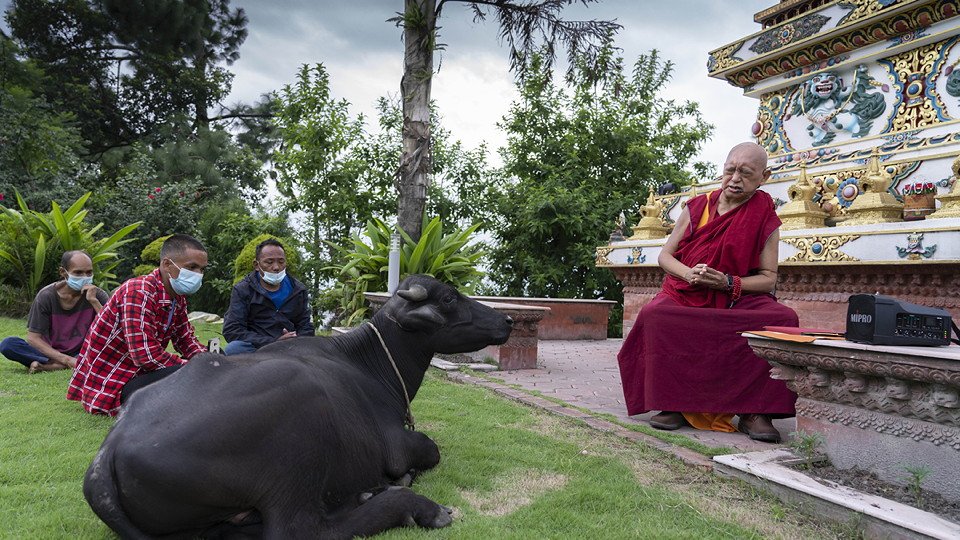
Lama Zopa Rinpoche reciting mantras to a young buffalo that he liberated for His Holiness the Dalai Lama and Kopan monks and nuns, Kopan Monastery, Nepal, August 2021. Photo by Ven. Lobsang Sherab.
Lama Zopa Rinpoche continues his video teachings on thought transformation from Kopan Monastery in Nepal. Here is a summary of the most recent teaching:
Rinpoche begins this teaching by reminding us that we are so fortunate to have received a precious and perfect human rebirth. While it is precious, it is also fragile and can be ended at any time with death. In this precious life we have received teachings on how we should not harm any sentient being, and not just the ones we love and like to help, but including those we don’t like such as mice, rats, spiders, cockroaches, and mosquitoes. When mosquitoes come near your ears you become very concerned with the real I, which doesn’t even exist in mere name. This has been happening since beginningless rebirths. So much suffering, including all wars, comes from believing in the real I! Even spiders and ants suffer due to believing in the real I.
The pandemic and all of the disasters of the world are happening because of ignorance. This all comes from the mind. Therefore, you have to take care of the mind: don’t let it go berserk. If you don’t want to suffer, if you don’t want bad things in the world, if you don’t want problems with the environment, if you want to make a happy world, then take care of the mind.
Rinpoche shares several stories about how great bodhisattvas are able to manipulate the elements or perform actions that look like miracles. They are able to do this due to their minds. Whether you make the world more peaceful or not depends on your mind. Rinpoche also shares the story of how the young incarnation of His Holiness the Fourteenth Dalai Lama said, “I’m the one who works for all beings” to the lama Keutsang Rinpoche when he came to check whether the four-year-old child recognized him. Rinpoche expressed being moved to tears when he heard that His Holiness had said that as a young child.
Rinpoche then discusses verses 5.4-5.5 of Bodhicharyavatara:
Tigers, lions, elephants, bears,
Snakes, and all enemies,
The guardians of hell beings,
Evil spirits, and likewise cannibals,
Are all fastened
By fastening only this mind.
They are all subdued
By subduing only this mind.
Rinpoche urges us to write these verses down in our prayer books so we will see them every day. Especially when we are angry or selfish, or when we have so much attachment. When we subdue our minds, everything is subdued. When we have control over our minds, we are free from fear. By controlling our minds and making them free from attachment and anger, from the self-cherishing thought, and from the ignorance holding the I as real when it’s not, then, all those who would otherwise harm us are subdued.
We produce all the suffering we experience with our mind, so the solution for problems, harm, enemies, and fear is to pacify the mind.
Verse 5.12cd of Bodhicharyavatara says:
If you subdue the mind of anger alone,
It is like you have subdued all your enemies.
And as Nagarjuna said:
If you kill your anger,
You kill all your enemies.
We have to learn this if we want to bring peace and happiness to the world. Otherwise, you just talk, talk, talk. Everything depends on whether you control your mind or not. Rinpoche translates verse 5.3 of Bodhicharyavatara as:
If you fasten the elephant of your mind
With the rope of remembrance all the time,
All fears will become nonexistent
And all virtues will come into your hands.
By subduing the mind, which is like a crazy elephant, you can achieve anything you want. Whether or not you experience samsara or nirvana, hell or enlightenment—this all depends on whether or not you control your mind.
Verse 5.17 of Bodhicharyavatara says:
If someone doesn’t know the supreme principal of the Dharma,
The secrecy of the mind,
Even if they wish to achieve happiness and destroy suffering,
They will wander in samsara without meaning.
and verse 5.18cd:
Except for conduct protecting the mind
What is the use of so many conducts?
Rinpoche explains that all the capacities of the mind are based on keeping the higher training of morality. He shares the story of how Lama Yeshe stopped a fire with his mind. He also shares a story about how Geshe Lama Konchog saved a child, who all the doctors said was going to die, by the power of his mind through doing puja. The West needs to learn that world peace comes from the mind, not from outside influence.
Discussing the verses below, Rinpoche says that when you don’t keep and protect your vows and your practice of morality, you will be criticized by all the buddhas, and your friends will scold you. You will even criticize yourself! But if you keep pure morality, all the buddhas will praise you and all of your prayers will succeed.
Chen Nga Lodro Gyaltshen, a Kadampa geshe advised in Dulwäi Lung:
Anyone who does not protect their vows
Will be put down by all the buddhas.
All the devas will criticize them as thieves.
Their friends will scold them.
They will even put themselves down.
They will also naturally be worthy of being criticized.
Their bad reputation will pervade all directions.
They won’t hear the holy Dharma.
Even if they hear it, they will quickly forget it.
They won’t generate the realizations of the grounds and paths.
While regretting, they will die and go to evil migrations.
In dreams, they will see vicious things
And, with suffering, they will be killed.
The devas will not protect them.
When they are in the presence of holy beings,
They will be scared and feel regret for their mistakes.
Since humans and non-humans will examine them,
They will be able to quickly harm them.
They will be unable to find enjoyments without difficulties.
They also won’t achieve what they wish.
Those who keep pure morality
Will be praised by all the buddhas
And all their wishes will be fulfilled.
Apply what was explained before to them.
During the dedications, Rinpoche shares the story about a young buffalo he recently liberated and named Bodhichitta. This buffalo showed great devotion to Rinpoche and sat down at Rinpoche’s feet when Rinpoche recited mantras. The buffalo had tears in both eyes during the recitation. You can read Rinpoche’s explanation of why he liberated this buffalo and also watch a short video of Rinpoche reciting prayers for him.
We invite you to go deeper into the topics presented here, plus many others, by watching Rinpoche’s video and reading the full transcript of Rinpoche’s teaching.
Watch Lama Zopa Rinpoche’s teaching “Don’t Let Your Mind Go Berserk”:
https://youtu.be/4z0txtA354g
- Read the transcript of Rinpoche’s teaching
- The Eight Prayers is a collection of prayers which is commonly recited in the Gelug monastic communities for the recently deceased. King of Prayers, the extraordinary aspiration of the prayer of Samantabhadra, is commonly recited to bring benefit to those who are sick or have just passed away, and for the success of a virtuous project.
- Find Rinpoche’s Teachings on Thought Transformation translated into Spanish, Italian, French, Chinese, and Russian
- Dedication verses for COVID-19 Crisis Teachings
Watch more from the video series Lama Zopa Rinpoche’s Teachings on Thought Transformation during the Time of COVID-19 and find links to videos in transcripts, MP3s, additional practice advice, and more:
https://fpmt.org/fpmt/announcements/resources-for-coronavirus-pandemic/advice-from-lama-zopa-rinpoche-for-coronavirus/
Practice advice from our teachers, Dharma study-from-home opportunities, and more can be found on the page “Resources for the Coronavirus Pandemic.”
Lama Zopa Rinpoche is the spiritual director of the Foundation for the Preservation of Mahayana Tradition (FPMT), a Tibetan Buddhist organization dedicated to the transmission of the Mahayana Buddhist tradition and values worldwide through teaching, meditation and community service.
- Tagged: advice from lama zopa rinpoche, coronavirus, lama zopa rinpoche advice for sangha, lama zopa rinpoche thought transformation video teaching, mind training, three higher trainings, video
18
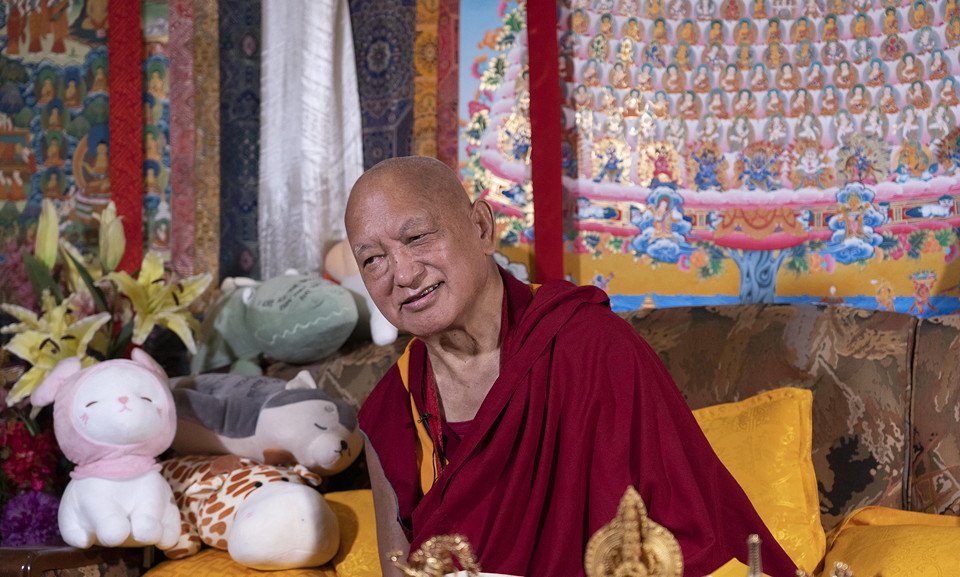
Lama Zopa Rinpoche during a video teaching on thought transformation, Kopan Monastery, Nepal, August 2021. Photo by Ven. Lobsang Sherab.
Lama Zopa Rinpoche continues his video teachings on thought transformation from Kopan Monastery in Nepal. Here is a summary of the most recent teaching:
Lama Zopa Rinpoche continues his teachings for ordained Sangha, which are open to all who wish to benefit from his advice. He explains that trying on being Sangha, like trying different foods hoping they bring you happiness, is not being real Sangha. You can enjoy wearing the robes and trying them on, but if it is just like a trip, your mind is not Sangha. If your mind is messy and not healthy, you easily give up your liberation and enlightenment.
Rinpoche then reminds us of the motivation for listening to the teachings. A perfect human rebirth—qualified by the eight freedoms and ten richnesses—is extremely rare, Rinpoche explains. It is not enough for ourselves to be free from the oceans of samsaric sufferings. The real purpose of life is to not harm others and on the basis of that to benefit the numberless sentient beings and free them from the oceans of samsaric sufferings by oneself alone. We listen to the teachings to achieve this.
As Rinpoche explained in his recent teachings, by engaging in nonvirtue, you become habituated to it and do it again. By doing this, you make your future lives sooo difficult. You know that it’s bad, but you can’t stop doing it due to past habituation. In fact, much of your behavior is due to habituation with negative karma, and due to that habituation, it becomes more and more difficult to separate from negative karma. You think only of today’s happiness, not about future lives. Your wrong concept is cheating you, causing you to drown in an ocean of attachment and anger.
The coronavirus manifests in different ways according to one’s karma. Some people have some pain and sickness, some have no symptoms, and some die. Rinpoche discusses some of the different ways the virus has manifested in people he knows, and also the possibility that he had the virus himself just with very mild symptoms. When we meet with suffering, we don’t remember karma. We can even believe killing ourselves is the solution to the pain we are experiencing. When one is having emotional problems, spirits can also harm you. Rinpoche shares some examples of people who have been harmed by spirits.
Rinpoche then reads and gives commentary on the Sutra on Having Perfect Morality. (This starts at 50:19 in the video.)
Referencing Nagarjuna in Letter to a Friend, Rinpoche reminds us again that even great pain in the human realm is nothing compared to a small suffering in the hell realm, and the suffering has to be experienced until the negative karma finishes.
Rinpoche concludes by saying that Sangha are given unbelievable freedom by being able to purify twice a month with sojong, which is the monastics’ confession day. You should think that Guru Shakyamuni Buddha is reciting sojong for you. Because we can’t see Buddha in that aspect, he recites in the form of the abbot. You see the abbot reciting it, but you should know that it is actually Buddha reciting for the Sangha. Buddha is so kind. Unbelievable, most incredible.
We invite you to go deeper into the topics presented here, plus many others, by watching Rinpoche’s video and reading the full transcript of Rinpoche’s teaching.
Watch Lama Zopa Rinpoche’s teaching “By the Force of Habituation, You Uncontrollably Engage in Nonvirtue Again“:
https://youtu.be/Tr_3KGSqTDI
- Read the transcript of Rinpoche’s teaching
- You can learn about the international FPMT community of monks and nuns by visiting the International Mahayana Institute website.
- Find Rinpoche’s Teachings on Thought Transformation translated into Spanish, Italian, French, Chinese, and Russian
- Dedication verses for COVID-19 Crisis Teachings
Watch more from the video series Lama Zopa Rinpoche’s Teachings on Thought Transformation during the Time of COVID-19 and find links to videos in transcripts, MP3s, additional practice advice, and more:
https://fpmt.org/fpmt/announcements/resources-for-coronavirus-pandemic/advice-from-lama-zopa-rinpoche-for-coronavirus/
Practice advice from our teachers, Dharma study-from-home opportunities, and more can be found on the page “Resources for the Coronavirus Pandemic.”
Lama Zopa Rinpoche is the spiritual director of the Foundation for the Preservation of Mahayana Tradition (FPMT), a Tibetan Buddhist organization dedicated to the transmission of the Mahayana Buddhist tradition and values worldwide through teaching, meditation and community service.
- Tagged: advice from lama zopa rinpoche, coronavirus, lama zopa rinpoche thought transformation video teaching, video
17
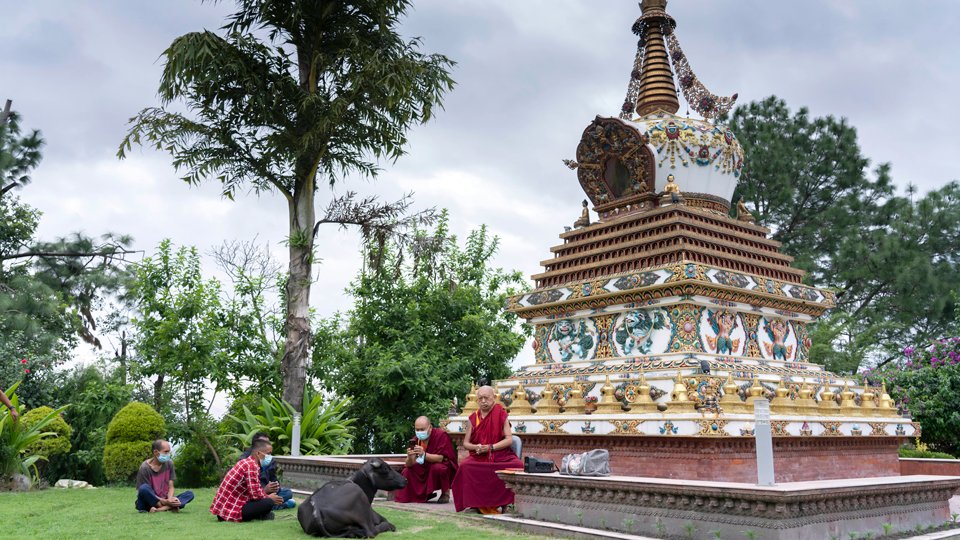
Lama Zopa Rinpoche blessing a buffalo that he named Bodhichitta, Kopan Monastery, August 2021. Photo by Ven. Lobsang Sherab.
Benefiting animals is a high priority for FPMT and one of Lama Zopa Rinpoche’s Vast Visions for the organization. Rinpoche recently liberated and blessed a water buffalo, which are often butchered for meat in Nepal. Rinpoche, who appeared to have a strong connection with the buffalo, tells the moving story of the blessing, calling his account the “BBC News” from Kopan Monastery:
Three monks recently got sick at Kopan and this buffalo was bought for His Holiness the Dalai Lama and all the Kopan monks and nuns, for their safety. This time I asked Tenpa Choden to buy a buffalo. He bought a small one, so that the cow of Kopan Monastery and the buffalo will not fight.
There is one monk, who got sick again. I have been doing pujas for him. He did not ask me to, but for many years he has been taking care of many young men in Nepal who had gotten involved in drugs and alcohol. He helps them to stop and then to find jobs. The project he is doing has been so difficult, and he has 300 children he helps—those who don’t have parents, who are very poor. He has been soooo busy giving food to sooooo many poor Nepalis, as well as Sherpas and Tibetans, because of the virus. So I also liberated the buffalo for him.
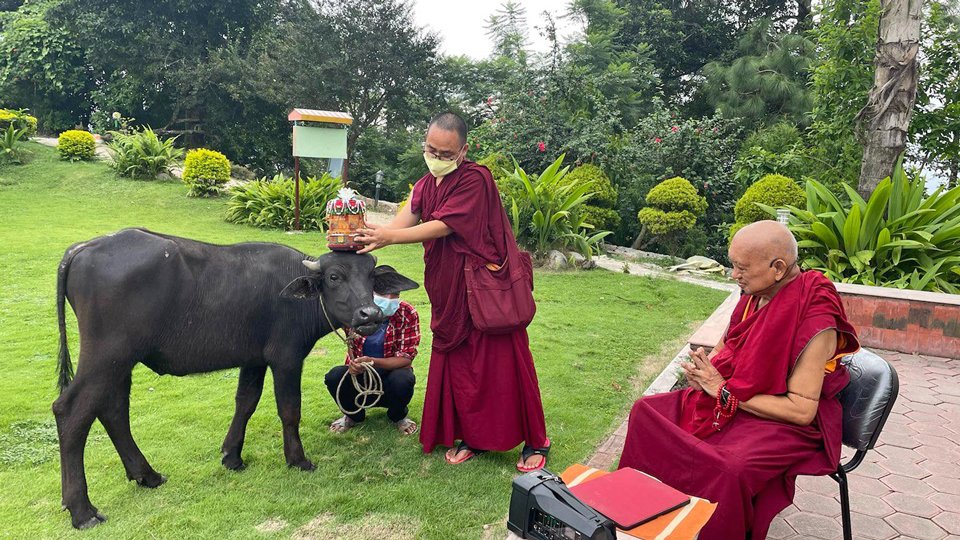
Lama Zopa Rinpoche, Ven. Sherab, and Bodhichitta the buffalo, Kopan Monastery, August 2021. Photo by Ven. Thubten Tendar.
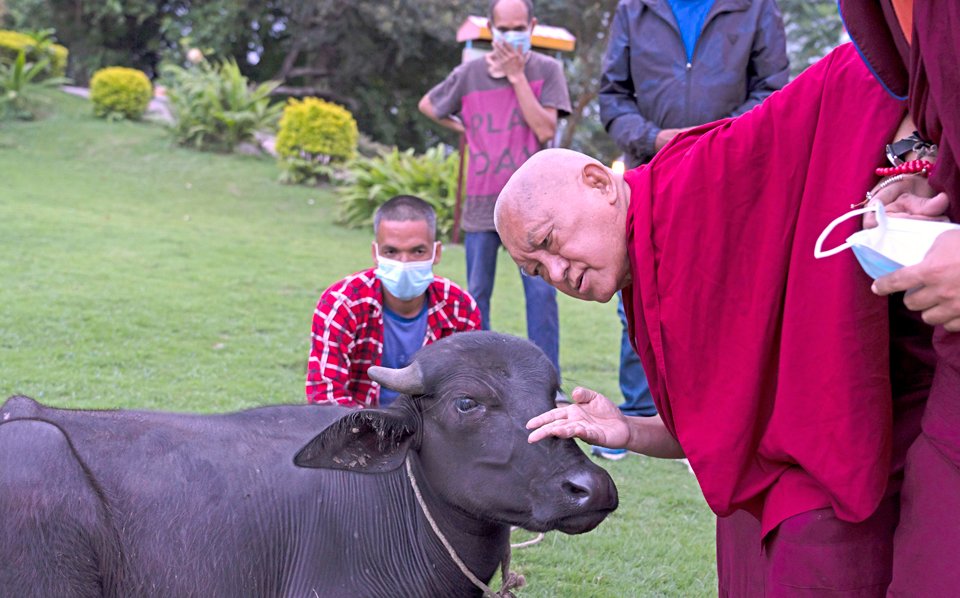
Lama Zopa Rinpoche blessing a buffalo that he named Bodhichitta, Kopan Monastery, August 2021. Photo by Ven. Lobsang Sherab.
Now the story of the buffalo is this: it took some hours for me to come down to recite mantras and prayers to bless the buffalo. I also recited several different very precious mantras and The Three Principal Aspects of the Path by Lama Tsongkhapa. During all that time, he was in the garden, eating in the corner, but when he was brought to me, he sat down by himself, then looked directly at me. The worker who brought the buffalo said the buffalo missed his home, from where he came. I looked at the buffalo, and he was looking at Tendar and Sherab. Sherab thought he was looking at a spider that was on the cement. Then from the buffalo’s eyes tears came out—out of both eyes, one by one.
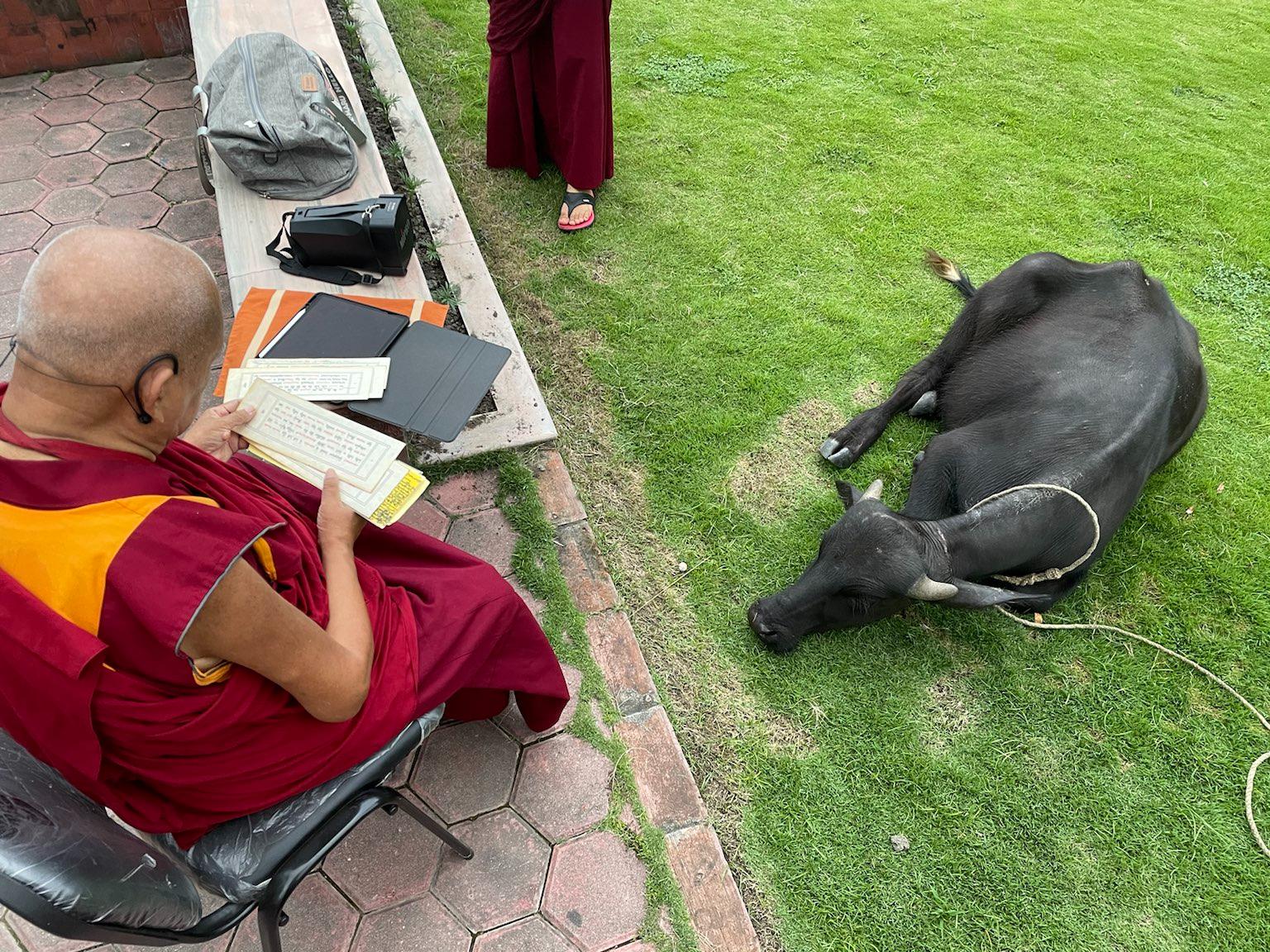
Lama Zopa Rinpoche blessing a buffalo that he named Bodhichitta, Kopan Monastery, August 2021. Photo by Ven. Thubten Tendar.
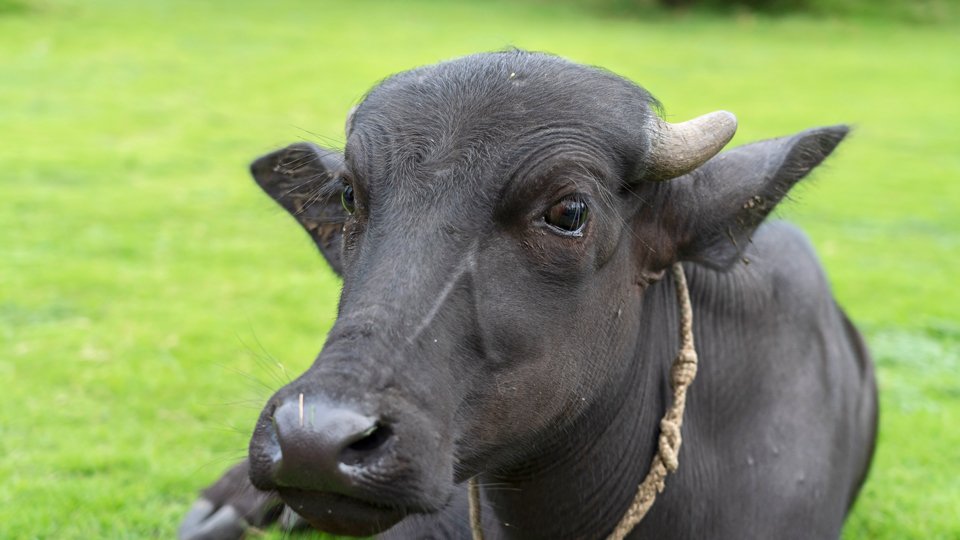
Bodhichitta the buffalo, Kopan Monastery, August 2021. Photo by Ven. Lobsang Sherab.
I went to see him again and recite mantras. He was not standing. It took time. The man brought something for him to eat. Then slowly we took the buffalo around Geshe Lama Konchog’s stupa. He had gone around before, quite a few times, before I came down.
This is “BBC News” from a Kopan room, middle room, the smaller one.
Most of the time when I recited the prayers, he sat with his head stretched towards me.
I gave him the name Bodhichitta, for a good imprint.
—From Lama Zopa Rinpoche, about Bodhichitta the Buffalo, Kopan Monastery, Nepal, August 15, 2021
For more from Lama Zopa Rinpoche about the buffalo, please watch this touching video:
https://youtu.be/9sbZm1Xk_5M
Support the Animal Liberation Fund, which supports ongoing animal liberations:
https://fpmt.org/projects/fpmt/alf/
Learn more about benefiting animals, including advice from Lama Zopa Rinpoche and links to practices and materials:
https://fpmt.org/education/prayers-and-practice-materials/benefiting-animals-practices-and-advice/
- Tagged: animal liberation, animals, lama zopa rinpoche
11

Lama Zopa Rinpoche shopping for flower offerings, Boudhanath, Nepal, July 2021. Photo by Ven. Lobsang Sherab.
Lama Zopa Rinpoche continues his video teachings on thought transformation from Kopan Monastery in Nepal. Here is a summary of the most recent teaching:
Rinpoche begins this video reminding listeners that while this teaching is being given specifically for ordained Sangha, anyone is welcome to take the advice offered.
If you haven’t spent your life with a good heart and a positive mind, Rinpoche warns, and instead spend your life trying this and that until life finishes, then you will go to the lower realms. There are many wrong views available to you in this life. You have to check the quality of these views carefully, the same way you check the quality of clothing or food before you purchase it.
Rinpoche then recounts several stories, including about the building of Lama Yeshe’s stupa at Tushita Meditation Centre, Tsenshap Serkong Rinpoche, and Serkong Dorje Chang.
Rinpoche reminds us of the motivation for listening to the teachings—to free the numberless sentient beings from oceans of samsaric sufferings and bring them to enlightenment by oneself alone. Therefore, you think of how you must achieve the state of omniscience to do that. Therefore, you are listening to the teachings.
Being attached to sex has not freed you from the oceans of samsaric suffering, Rinpoche observes. Since beginningless times, every sentient being has been one’s own husband, wife, children, and so forth. You have cheated yourself by thinking that the pleasures of this life that you experience are new. You believe you are meeting someone for the first time.
By learning Dharma, you can recognize right and wrong concepts. Usually in the world, any suffering is attributed to outside influences: animals, insects, other people. Rinpoche explains that this is from not knowing Dharma. Learning about Dharma is learning about your life, your mind, and your concepts. It is learning what is the right mind and what is the wrong mind, so you can stop having the wrong mind. Then you can have a healthy, beneficial, harmless, and right life, and have all the good things right up to perfect enlightenment.
You have been totally deceived by your attachment and wrong concepts since beginningless rebirths. Therefore, there is nothing to be attached to. It’s all a hallucination! Since there is nothing to be attached to, you should renounce samsara. Samsaric happiness is only suffering; this is the heart of Buddhism.
You experience suffering until your negative karma finishes, Rinpoche explains. Even great pain in the human realm is nothing compared to a small suffering in the hell realm.
Rinpoche then shares the four suffering results of sexual misconduct:
- The Ripened-Aspect Result of Sexual Misconduct: This means a rebirth in the lower realms.
- The Possessed Result of Sexual Misconduct: You are born as a human being but the environment is muddy, dirty, unhealthy, and has contagious diseases and viruses. Even if we just spend five minutes in a place like this, that is the result of past sexual misconduct.
- Experiencing the Result Similar to the Cause of Sexual Misconduct: However you harmed others, you experience others doing this type of harm to you.
- Creating the Cause Similar to the Result: This is done due to habituation with the past negative karma of sexual misconduct. Even if you think an action is bad, you do it uncontrollably. By engaging in nonvirtue, you become habituated to it, and do it again and again. This is the same for stealing, telling lies, killing—any negative behavior you’re engaged in.
Even in lay life you can abandon sexual misconduct. There are five lay vows one can take to help abstain from negative actions such as sexual misconduct. In this teaching we are discussing the purpose to become Sangha.
Rinpoche then recites the Phagpa Chulung Rolpai Do Mantra: OṂ HANU PHASHA BHARA HE YE SVĀHĀ. He explains that each time you see this mantra, it purifies your negative karma, one hundred thousand eons!
Rinpoche also holds up the Buddha’s Teachings on Our Lives card and explains that this is so important to have in a room in one’s home, even in the bathroom.
We invite you to go deeper into the topics presented here, plus many others, by watching Rinpoche’s video and reading the full transcript of Rinpoche’s teaching.
Watch Lama Zopa Rinpoche’s teaching “Being Attached to Sex Has Not Freed You from the Oceans of Samsaric Sufferings”:
https://youtu.be/Lmw-Tzymu08
- Read the transcript of Rinpoche’s teaching
- You can download the cards Rinpoche mentioned in the teaching from the Foundation Store: Phagpa Chulung Rolpai Do Mantra and Six Syllables of Clairvoyance Mantra PDF and Buddha’s Teachings on Our Lives PDF.
- Find Rinpoche’s Teachings on Thought Transformation translated into Spanish, Italian, French, Chinese, and Russian
- Dedication verses for COVID-19 Crisis Teachings
Watch more from the video series Lama Zopa Rinpoche’s Teachings on Thought Transformation during the Time of COVID-19 and find links to videos in transcripts, MP3s, additional practice advice, and more:
https://fpmt.org/fpmt/announcements/resources-for-coronavirus-pandemic/advice-from-lama-zopa-rinpoche-for-coronavirus/
Practice advice from our teachers, Dharma study-from-home opportunities, and more can be found on the page “Resources for the Coronavirus Pandemic.”
Lama Zopa Rinpoche is the spiritual director of the Foundation for the Preservation of Mahayana Tradition (FPMT), a Tibetan Buddhist organization dedicated to the transmission of the Mahayana Buddhist tradition and values worldwide through teaching, meditation and community service.
- Tagged: advice from lama zopa rinpoche, buddha's teachings on our lives, coronavirus, lama zopa rinpoche advice for sangha, lama zopa rinpoche thought transformation video teaching, phagpa chulung rolpai do mantra, sexual misconduct, video
5
Advice on Group Water Bowl Retreats at Home
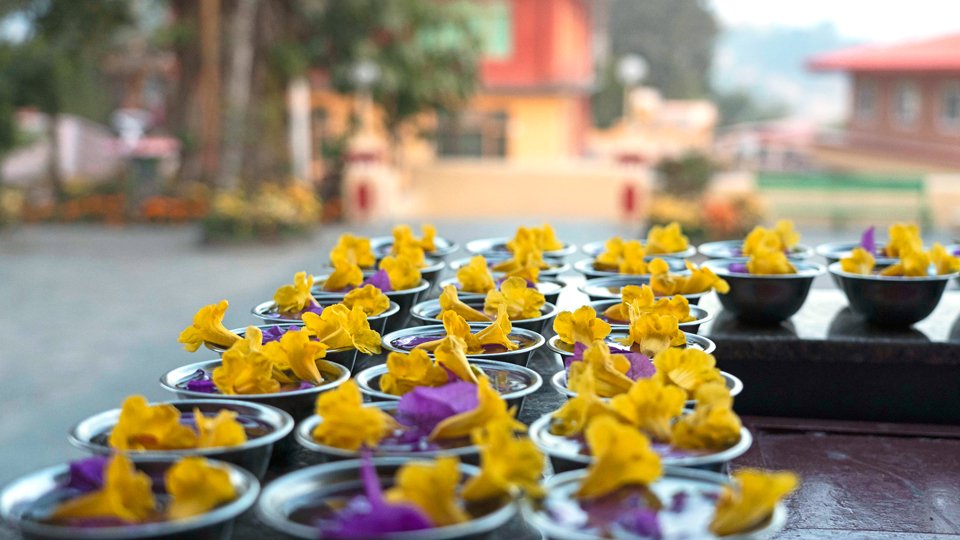
Extensive offerings on Lama Tsongkhapa Day, Kopan Monastery, December 2020. Photo by Ven. Lobsang Sherab.
Among the preliminary practices, only that of water bowl offerings can be done in a group practice and allows one to add the numbers accumulated by the group’s participants into one’s own count.
In 2020, a center director wrote to Lama Zopa Rinpoche asking whether participants in a group water bowl practice, who were doing the practice in their homes, could still count all the water bowls accumulated by the group, even though everyone was doing the practice separately. Rinpoche responded that yes, people can do water bowls separately in their own home as part of a group, and count all the water bowls made by the group participants as their personal accumulation.
To do this properly, Rinpoche explained, the participants would need to know who is in the water bowl practice group and they would all need to be doing the practice at the same time. So it wouldn’t work if one person offered the water bowls but another person in the group hadn’t finished doing their water bowls or if they didn’t do them that day. It needs coordination. For example, everyone who is part of a home water bowl offering group should agree to a specific time by which all the water bowls are completed. Then the water bowls can be collectively offered. If you do it this way, you can count all the bowls of those who are participating as your personal accumulation.
Rinpoche said that when you do the actual offering practice it is best if you not only offer the water bowls you are doing as a group, but all the water bowls at all the FPMT centers, projects, and services, and also Rinpoche’s house. And to have an even more vast offering, you can visualize the universes full of offerings.
The main reason for these practices is purification, Rinpoche explained. And that comes through experiencing difficulties and hardship in what you are doing. Of course, all these offerings create incredible merit when you visualize this way.
Just to be clear, one can’t include the count of all the water bowls in all the centers toward their own accumulation, but one can and should offer them.

Water bowl offering, Martigny, Switzerland, 2018. Photo by Harald Weichhart.
Several resources are available to support the practice of offering water bowls:
- Please refer to the newly updated booklet Extensive Offering Practice for the water bowl offering practice, which contains the “Actual Offering Prayer ” that is recited when one makes the actual offering.
- The Preliminary Practice of Altar Set-up & Water Bowl Offerings is a booklet that provides an explanation of how to set up a personal altar and how to make water bowl offerings.
- The water bowl offering practice can be done in the conjunction with a guru yoga practice, such as A Daily Meditation on Śākyamuni Buddha, Lama Tsongkhapa Guru Yoga, or Lama Chopa.
Lama Zopa Rinpoche is the spiritual director of the Foundation for the Preservation of Mahayana Tradition (FPMT), a Tibetan Buddhist organization dedicated to the transmission of the Mahayana Buddhist tradition and values worldwide through teaching, meditation and community service.
Watch Rinpoche’s recent teachings and find links to transcripts, MP3s, additional practice advice, and more on the page Lama Zopa Rinpoche’s Teachings on Thought Transformation during the Time of COVID-19.
3
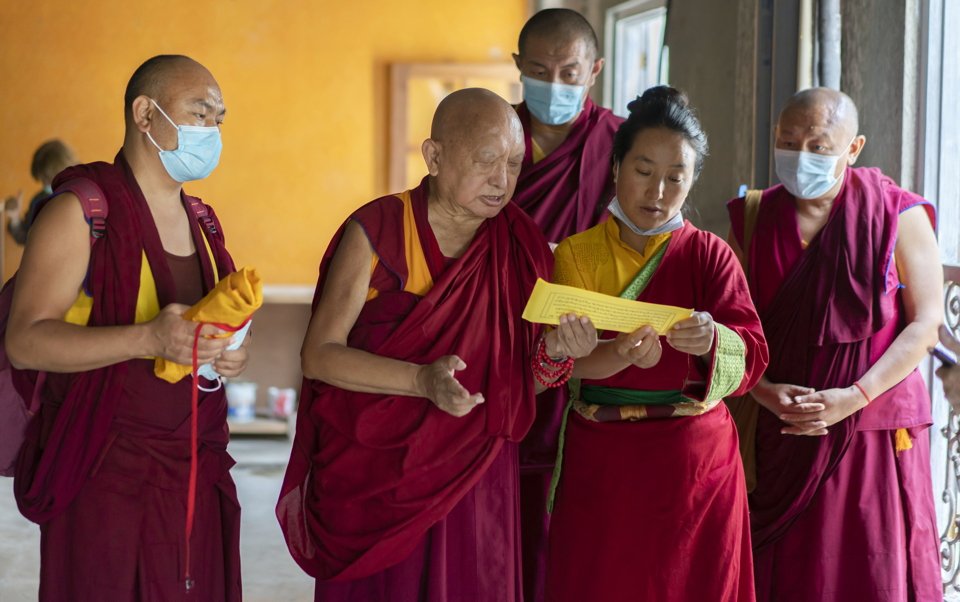
Rinpoche and Khadro-la doing prayer where the Himalayan Buddhist Meditation Centre, the FPMT center in Kathmandu, is going to be, Nepal, July 2021. Photo by Ven. Lobsang Sherab.
Lama Zopa Rinpoche continues his video teachings on thought transformation from Kopan Monastery in Nepal. Here is a summary of the most recent teaching:
Lama Zopa Rinpoche begins this teaching by referencing this quote by Thogme Sango in Thirty-Seven Practices of a Bodhisattva:
All sufferings come from desiring happiness for oneself.
Full enlightenment comes from the thought of benefitting others.
Therefore, exchanging one’s own happiness for the suffering of others
Is the practice of bodhisattvas.
Rinpoche gives commentary on this passage and explains that all undesirable things, all the sufferings we experience, come from desiring happiness for oneself. Therefore, exchanging one’s own happiness for the suffering of others is the practice of bodhisattvas.
When pleasure and problems happen, you can see whether or not you are practicing Dharma. When a problem comes, it is like you are completely drowned in the ocean. Instead of thinking of Dharma to solve and overcome your problem, you are “under” the problem, not having control over it. When pleasure comes, you are totally distracted by it, you are under the control of worldly concern and attachment, again—like you are drowning in the ocean. This is when you can see if you are practicing Dharma or not.
Because you are a human being, and not a stone or wood, you can benefit others. Even the ants or mosquitoes—you can make sure not to step on them, you can take them around holy objects, you can do what you can to benefit them. Reciting OM MANI PADME HUM three times and blowing on any sentient being purifies so much negative karma. If you aren’t living to benefit others, you are living a very dry, uninteresting, boring life! Using your life to achieve enlightenment is not boring at all.
Rinpoche then reviews the motivation for receiving oral transmissions and teachings. He also discusses the great yogi Thangtong Gyalpo in preparation for the oral transmissions he gives later in the teaching.
Before the oral transmissions, Rinpoche explains that the benefits of reciting and hearing OM MANI PADME HUM are extensive. Rinpoche lists many of these benefits and provides commentary on each:
- Reciting it one time purifies the four defeats of a fully ordained monk
- Reciting it purifies the five heavy negative karmas without a break
- Reciting it seven times purifies the negative karma of one hundred lifetimes
- Reciting it twenty-one times purifies the negative karma of 1,000 eons
- Reciting it 108 times purifies the negative karma of 40,000 eons
- Anyone who hears it gets a higher rebirth
- When you recite it, your mind is free from expectations and therefore pure
In short, Rinpoche stresses to us that we must recite OM MANI PADME HUM while we still have a perfect human rebirth.
Rinpoche then offers, “a million, zillion, trillion” thanks to everyone who join together on Saturdays for twenty-four hours to recite OM MANI PADME HUM for the COVID-19 pandemic. He also thanks everybody at Chenrezig Institute who arranged all the technical aspects that allow for this to happen online.
Rinpoche ends this video by offering commentary on and the oral transmissions in Tibetan of three prayers of Thangtong Gyalpo: “Liberating Sakya from Disease” (starting at 37:45 in the video), “Words of Truth Pacifying the Danger of Weapons” (39:45), and “A Request to Pacify the Fear of Famine” (42:57). Rinpoche also offers the oral transmission of King of Prayers (1:01:21), Homage to Tathagata Amitabha and Buddha Amitayus, A Brief Prayer to Be Reborn in Sukhavati (1:11:04), and The Array of Sukhavati Pure Land (1:13:15).
We invite you to go deeper into the topics presented here, plus many others, by watching Rinpoche’s video and reading the full transcript of Rinpoche’s teaching.
Watch Lama Zopa Rinpoche’s teaching “A Zillion Thanks to the Sangha for Reciting Manis During the Pandemic”:
https://youtu.be/D8v5VTdAANs
- Read the transcript of Rinpoche’s teaching
- Links to the oral transmission texts:
- The Vajra Speech of Mahasiddha Thangtong Gyalpo: The Blessed Prayer Known as “Liberating Sakya from Disease”
- The Vajra Speech of Mahasiddha Thangtong Gyalpo: Words of Truth Pacifying the Danger of Weapons
- The Speech of Mahasiddha Thangtong Gyalpo: A Request to Pacify the Fear of Famine
- King of Prayers
- Homage to Tathagata Amitabha and Buddha Amitayus, A Brief Prayer to Be Reborn in Sukhavati
- The Array of Sukhavati Pure Land
- Find Rinpoche’s Teachings on Thought Transformation translated into Spanish, Italian, French, Chinese, and Russian
- Dedication verses for COVID-19 Crisis Teachings
Watch more from the video series Lama Zopa Rinpoche’s Teachings on Thought Transformation during the Time of COVID-19 and find links to videos in transcripts, MP3s, additional practice advice, and more:
https://fpmt.org/fpmt/announcements/resources-for-coronavirus-pandemic/advice-from-lama-zopa-rinpoche-for-coronavirus/
Practice advice from our teachers, Dharma study-from-home opportunities, and more can be found on the page “Resources for the Coronavirus Pandemic.”
Lama Zopa Rinpoche is the spiritual director of the Foundation for the Preservation of Mahayana Tradition (FPMT), a Tibetan Buddhist organization dedicated to the transmission of the Mahayana Buddhist tradition and values worldwide through teaching, meditation and community service.
- Tagged: advice from lama zopa rinpoche, amitabha buddha, array of sukhavati pure land, coronavirus, king of prayers, lama zopa rinpoche advice for sangha, lama zopa rinpoche thought transformation video teaching, mahasiddha thangtong gyalpo’s prayers, oral transmission, thang thong gyalpo, thangtong gyalpo, video
2
Beauty Is in the Eye of the Beholder
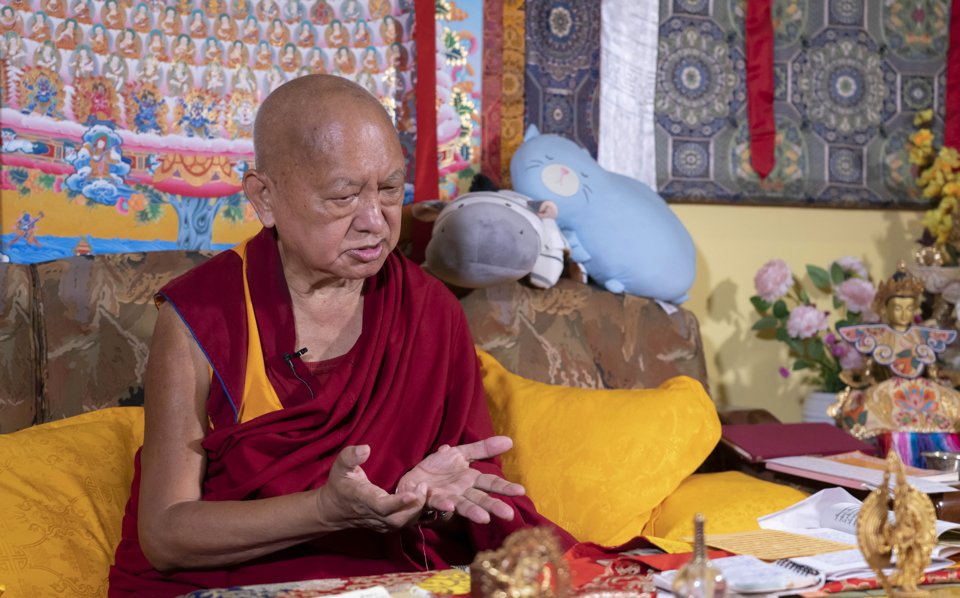
Lama Zopa Rinpoche giving an online teaching, Kopan Monastery, Nepal, July 2021. Photo by Ven. Lobsang Sherab.
Lama Zopa Rinpoche continues his video teachings on thought transformation from Kopan Monastery in Nepal. Here is a summary of the most recent teaching:
Rinpoche begins this teaching explaining that while he’s offering this teaching specifically to the Sangha at this time—to encourage them to keep their vows as those intent on the virtue that is nirvana—anyone is welcome to listen and benefit from the advice.
The total cessation of obscurations, is nirvana, ultimate happiness. It is forever, not like you are going on vacation, which is only temporary and is actually suffering, and not pleasure as your hallucinated mind believes. Because nirvana is everlasting happiness, it is worthwhile to bear hardships in order to practice Dharma. As an example, Rinpoche shares that Milarepa bore hardships such as living on nettles for many years and building a nine-story building three times alone, and then achieved enlightenment in a brief lifetime of degenerate times. This was due to all the hardships Milarepa experienced, not in spite of them. As another example, Rinpoche explains that the bodhisattva Always Crying One sacrificed himself to follow his guru and collected two great eons of merit in seven years’ time.
Right now you see samsara as a beautiful park in the same way that dogs see kaka as nectar. If you analyze it, you can see clearly that there is no pleasure existing from its own side. You label pleasure, but the mind is merely imputing this. The label came from the negative imprint left on the continuation of your consciousness since beginningless rebirths. Your entire life needs to be analyzed, then you recognize the truth. You discriminate “good” and “bad,” then attachment and anger arise. From there you create all the negative karma. This is why it is so important to learn Dharma! Everything is embodied in the lamrim, the three principal aspects of the path.
Samsaric pleasures cheat us, like honey on a knife. It is not only a hallucination, but it is what creates negative karma—not only suffering in this life but causes the lower realms. Being pierced by three hundred spears is nothing compared to a small suffering in hell. If you understood the suffering of hell, you would faint.
Grasping at samsaric pleasures is like a fish seeing a worm and getting caught on the hook. The fish sees the worm and thinks, “Oh! There’s something to eat!” They see pleasure and immediately jump toward it but then become hooked there and death follows. There are many examples like this—there is so much clinging to pleasure only to be cheated and destroyed by it.
Even beauty can’t be found when you analyze it. Someone you think of as so beautiful, visualize them without their skin. Then see them as a pile of skin, flesh, and bones—where is the beauty? Then using the example of blood: when the body is cut, one bleeds. This is frightening to see. Even the skin itself, if you looked at it with a magnifying glass, you can see all of the bumps. There’s no beauty to be attached to if you examine the body; it exists because you labeled it as beautiful, but this came from your mind. Your negative imprints project good and bad, you differentiate between beautiful and ugly, causing attachment and anger to arise. Without analyzing it looks like beauty comes from the outside, but that’s a total hallucination. This is why practicing mindfulness every day is necessary. It solves the wrong concept.
You can counteract attachment to someone’s body by thinking about what’s inside it—muscles, nerves, blood, flesh, skeleton. You can also counteract attachment to someone’s body by thinking it has a dirty smell when it isn’t washed and perfumed, or when it is dead.
Even insects project beauty onto other insects of the opposite sex and wish to have sex with them. The same is true for human beings; negative imprints cause us to see particular body parts as beautiful. From the side of the body, there is no beauty at all. It is difficult to take the lay vow to abstain from sexual misconduct because attachment overcomes the mind and defeats you. Then, celibacy for a monk or nun is very difficult. In reality, there is not one sentient being with whom you haven’t had a relationship. When you have so much attachment toward someone arise, you think this is the first time you are seeing them. But this person has been your wife and husband countless times; you have been their wife and husband countless times. There is not even one ant or insect you haven’t had a relationship with.
Until you have a stable mind, you should stay in a monastery, nunnery, cave, or hermitage. If your mind is weak, you should stay away from objects of desire. In this way, you are able to practice morality and keep your ordination.
We invite you to go deeper into the topics presented here, plus many others, by watching Rinpoche’s video and reading the full transcript of Rinpoche’s teaching.
Watch Lama Zopa Rinpoche’s teaching “Beauty Is in the Eye of the Beholder“:
https://youtu.be/S6hr1et8Qjg
- Read the transcript of Rinpoche’s teaching
- Find Rinpoche’s Teachings on Thought Transformation translated into Spanish, Italian, French, Chinese, and Russian
- Dedication verses for COVID-19 Crisis Teachings
Watch more from the video series Lama Zopa Rinpoche’s Teachings on Thought Transformation during the Time of COVID-19 and find links to videos in transcripts, MP3s, additional practice advice, and more:
https://fpmt.org/fpmt/announcements/resources-for-coronavirus-pandemic/advice-from-lama-zopa-rinpoche-for-coronavirus/
Practice advice from our teachers, Dharma study-from-home opportunities, and more can be found on the page “Resources for the Coronavirus Pandemic.”
Lama Zopa Rinpoche is the spiritual director of the Foundation for the Preservation of Mahayana Tradition (FPMT), a Tibetan Buddhist organization dedicated to the transmission of the Mahayana Buddhist tradition and values worldwide through teaching, meditation and community service.
- Home
- News/Media
- Study & Practice
- About FPMT Education Services
- Latest News
- Programs
- New to Buddhism?
- Buddhist Mind Science: Activating Your Potential
- Heart Advice for Death and Dying
- Discovering Buddhism
- Living in the Path
- Exploring Buddhism
- FPMT Basic Program
- FPMT Masters Program
- FPMT In-Depth Meditation Training
- Maitripa College
- Lotsawa Rinchen Zangpo Translator Program
- Universal Education for Compassion & Wisdom
- Online Learning Center
- Prayers & Practice Materials
- Overview of Prayers & Practices
- Full Catalogue of Prayers & Practice Materials
- Explore Popular Topics
- Benefiting Animals
- Chenrezig Resources
- Death & Dying Resources
- Lama Chopa (Guru Puja)
- Lama Zopa Rinpoche: Compendium of Precious Instructions
- Lama Zopa Rinpoche: Life Practice Advice
- Lama Zopa Rinpoche Practice Series
- Lamrim Resources
- Mantras
- Prayer Book Updates
- Purification Practices
- Sutras
- Thought Transformation (Lojong)
- Audio Materials
- Dharma Dates – Tibetan Calendar
- Translation Services
- Publishing Services
- Teachings and Advice
- Find Teachings and Advice
- Lama Zopa Rinpoche Advice Page
- Lama Zopa Rinpoche: Compendium of Precious Instructions
- Lama Zopa Rinpoche Video Teachings
- ༧སྐྱབས་རྗེ་བཟོད་པ་རིན་པོ་ཆེ་མཆོག་ནས་སྩལ་བའི་བཀའ་སློབ་བརྙན་འཕྲིན།
- Podcasts
- Lama Yeshe Wisdom Archive
- Buddhism FAQ
- Dharma for Young People
- Resources on Holy Objects
- Ways to Offer Support
- Centers
- Affiliates Area
- Teachers
- Projects
- Charitable Projects
- Make a Donation
- Applying for Grants
- News about Projects
- Other Projects within FPMT
- Support International Office
- Projects Photo Galleries
- Give Where Most Needed
- FPMT
- Shop
Translate*
*powered by Google TranslateTranslation of pages on fpmt.org is performed by Google Translate, a third party service which FPMT has no control over. The service provides automated computer translations that are only an approximation of the websites' original content. The translations should not be considered exact and only used as a rough guide.If you help others with sincere motivation and sincere concern, that will bring you more fortune, more friends, more smiles, and more success. If you forget about others’ rights and neglect others’ welfare, ultimately you will be very lonely.







